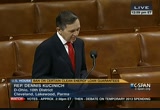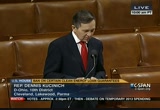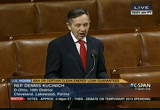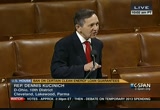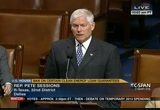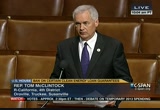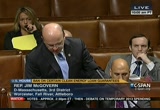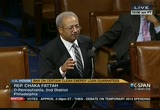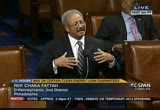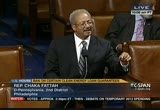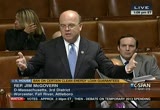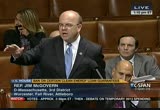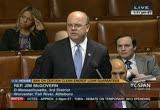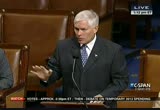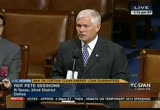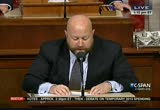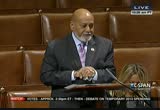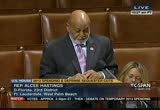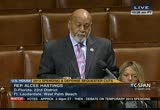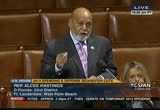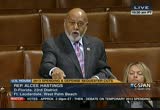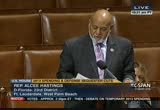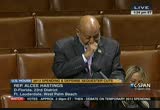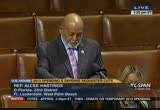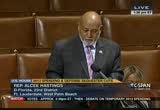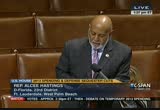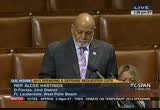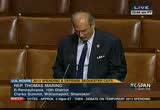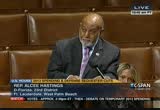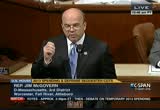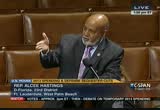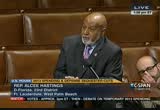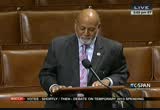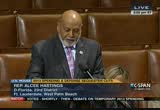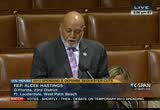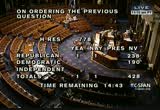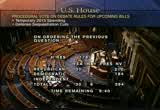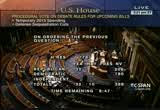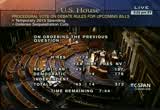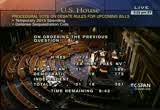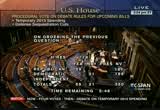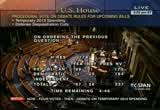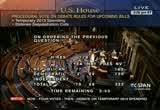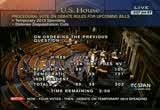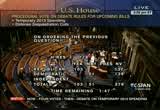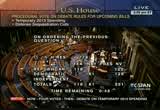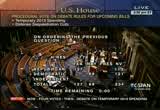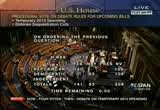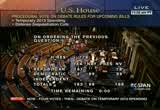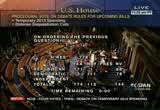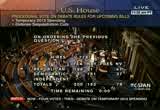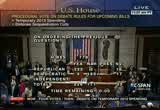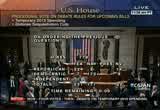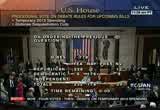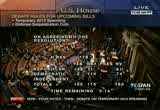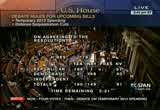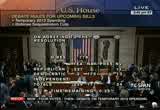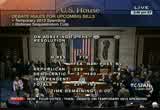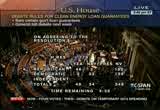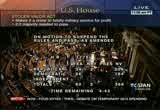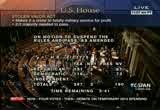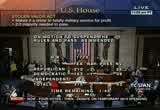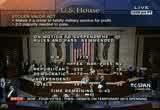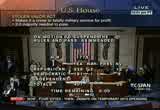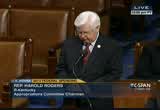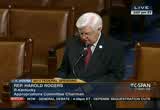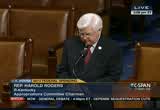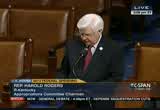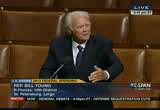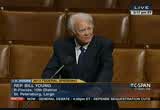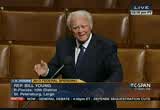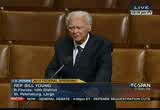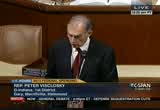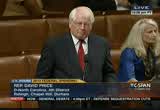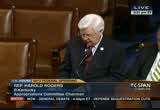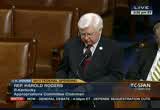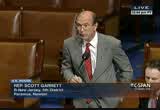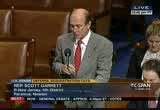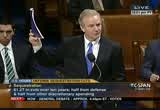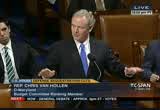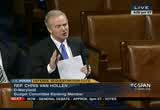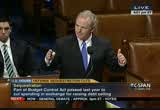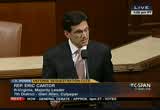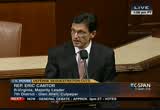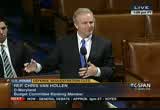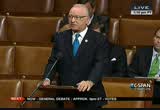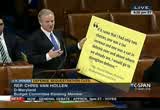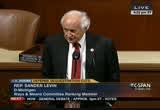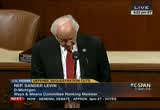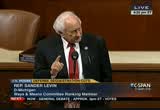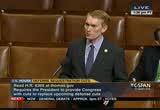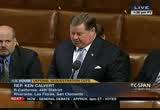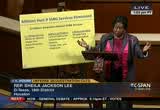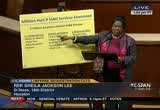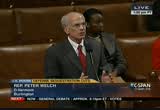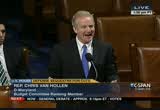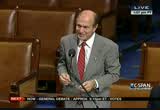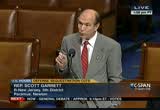tv U.S. House of Representatives CSPAN September 13, 2012 1:00pm-5:00pm EDT
1:00 pm
on energy projects but it's actually an attack on renewable energy. the real effect is laid bare by the effective data of the bill which grandfathers the worst of the worst of the worst energy boondoggles. specifically it allows nuclear power loan guarantee projects to proceed even though some create ex potionure for the federal government -- exposure for the federal government of about 15 times the exposure created by solyndra. . and these programs, nuclear loan programs, are more likely to fail. one of the biggest loan guarantees for nuclear, not even necessary. it's not my assessment, it's the assessment of kevin marsh, the president of south carolina electric and gas company, which is attempting to build a new nuclear power plant. he sat on a call to analysts and
1:01 pm
investors, we are confident in our ability to finance this project without a loan guarantee. could be in the $ billion to $10 billion range. the conflict here is generally wall street isn't investing, but you get a group of investors that think they can, but are they leveraging against a hope of government involvement? i don't know. the truth is nuclear power plants are simply not viable without massive government subsidies, which eclipse subsidies for renewable energy by orders of magnitude. the congressional budget office has had this to say about nuclear loan guarantees. the c.b.o. considers the risk of default on such loan guarantees to be very high. well above 50%. the former chairman of the nuclear regulatory commission cautioned that nuclear plants will, quote, will not, quote, move off the blackboard and into
1:02 pm
construction. not as long as natural gas re mains as plentiful as it is today. an article opposing the bill in the national review online states, quote, the total number of projects this bill grand -- could i have half a minute? mr. mcgovern: additional one minute. mr. kucinich: the total number of projects this bill grandfathers isn't publicly available. par for the course with this highly secretive program. we know it's a lot. our research points to nearly 100 projects who claim to have applied. this was really about being fiscally responsible with taxpayers' money, we would be targeting the projects that have the highest probability of failing and carry the highest price tag and preclude them, but the bill does the opposite. what we should be doing is continuing our efforts to invest in renewable. understanding some of them may not work, but that's the future. it's cleaner, it projects the globe. that's where the jobs tomorrow.
1:03 pm
we have to stop china from eating our lunch on these alternative energy projects. we have to reclaim this for america. bring the jobs here. create the jobs here. the money's there. don't go giving it to nuclear. nuclear is dead in the water unless government tries to resurrect it by giving away billions of dollars in taxpayers' money that will never be recovered. the speaker pro tempore: the gentleman's time has expired. the gentleman from massachusetts reserves. the gentleman from texas. mr. sessions: mr. speaker, thank you very much. i think it's very obvious that what republicans are trying to do is to keep american jobs. we are trying to utilize the free enterprise system, the natural resources that we have in america, clean, natural gas. the abundance of other power that we have, including coal, including nuclear. opportunities to keep america strong and keep jobs here. and that's why we are really
1:04 pm
opposed to the loan guarantees and the things which might take on additional debt and risk by the government, but more importantly if it can't be funded within the free enterprise system, then it can't stand on its own. mr. speaker, at this time i'd like to yield to the gentleman, one of my colleagues from roseville, california, the gentleman, mr. mcclintock, for one minute. the speaker pro tempore: the gentleman is recognized for one minute. mr. mcclintock: i thank the gentleman for yielding. mr. speaker, this bill ends the title 17 loan guarantees that produced solyndra and so many other alternative energy scams that -- alternate energy scams that cost americans hundreds of millions of dollars while the politically connected perpetrators of these scams walked away wealthy men and women. this measure does still put taxpayers on the hook to loan out billions of dollars more to at least 50 additional shady, alternate energy schemes that have been submitted unthe same title prior to january 1.
1:05 pm
so there will be more solyndras under this bill. i offered an amendment to pull the plug on the applications, but i was told don't bother, the rules committee won't allow the amendment to be brought to the floor. i support the bill, but i do agree with my friend from ohio that the title, no more solyndras act is misleading. i would suggest alternative the 50 more solyndras, then we'll stop wasting your money really, we promise act. yield back. the speaker pro tempore: the gentleman yield backs. gentleman from texas reserves the balance of his time. the gentleman from massachusetts. mr. mcgovern: mr. speaker, i want to thank the gentleman who just spoke for pointing out how bad this rule is. he's on the other side of the aisle and even though i disagree with the amendment he had, he ought to have been able to offer it on the floor. i hope that he will join with us in opposing this rule because i don't think his leadership will get the message if he rewards bad behavior by giving them a
1:06 pm
vote. so at this point i'd like to yield three minutes to the gentleman from pennsylvania, mr. fattah. the speaker pro tempore: the gentleman is recognized for three minutes. mr. fattah: i thank the gentleman. i am opposed to the rule and the bill, but i'm really opposed to the thinking behind this. this is like back to the future or the flat earth society or something. i don't know how we would have a space program if one failure stopped the whole show. i don't know how -- michael jordan was kicked off his high school basketball team. but he eventually learned how to put the ball in the basket. the notion that as the greatest nation on earth we are going to cede to others alternative energy programs that somehow we are unwilling to go through what is necessary to be successful in this field doesn't make any sense. president bush signed this into law. it's a great program.
1:07 pm
guy rogers, the c.e.o. of anything energy said a few days ago in terms of energy america is so much better off because of this administration's all of the above strategy. for the first time in 30 years we got nuclear plants that have been licensed. we have natural gas. we got oil. we have renewables. i've supported these loan guarantee programs. and like any loan program, you may have some loans that perform and some loans that don't perform. the vast majority of these loans perform very, very well. and america is better off for it. i was at the israeli embassy last night speaking to a group of scientists. they have been so far ahead of us on renewable energy it's a shame. we have seen what germany's done on wind. this party that is in the majority here, that wants to do away with wind energy credit, i don't know what the notion here
1:08 pm
is that somehow we as a country are not prepared to pay the price for progress. we are -- we have not won every battle we have been in but we have won every war. it's like one of our rockets or satellites not performing properly, but the head of nasa said that we are not in a business in which we cannot take risk. we have to take risks. when it comes to energy, our country has to be prepared to take risks. we cannot use the same level of safety to solve problems that we used to create these problems. this country and our status as the leading nation in the world requires us to take risk. and if this majority is so unimpressed with the ability of americans and americans to innovate and to compete in the renewable sector like others around the world, who are also getting help from their
1:09 pm
government, that is unfortunate. but for me i believe that america has to take risks. we are going to lose. we are going to win. but at the end of the day as we learn and go forward, it will allow us to continue to be number one. thank you. the speaker pro tempore: the gentleman's time has expired. the gentleman from massachusetts reserves the balance of his time. the gentleman from texas. mr. sessions: thank you, mr. speaker. mr. speaker, at this time have no additional speakers and reserve my time. the speaker pro tempore: the gentleman reserves. the gentleman from massachusetts. mr. mcgovern: thank you, mr. speaker. mr. speaker, we ought to have a debate in this chamber on energy, on our energy policy. whether or not we should invest in innovation, whether or not we should invest in renewable green, clean energy. i believe we should. my friend on the other side of the aisle believes not in the status quo, they believe in going backwards. they believe in investing not in new technologies but the old technologies. we should have that debate here. this bill really is not that
1:10 pm
debate because this bill is a political stunt. it's not anything real. it's not anything that is going anywhere. this is just politics as usual. and that's what makes this so frustrating. mr. speaker, i'm going to end where i began in my opening and that is, this is -- we are only here for a few days. i have never been part of a congress that has worked less than this congress. and has produced less than this congress. today's roll call has a great piece, congress on pace to be the least productive. is that what my friends on the other side of the aisle aspire to? to be known as the least productive congress? we are back for these few days, we ought to do something meaningful for the american people. we ought to be debating a jobs bill. we ought to bring the president's jobs bill to the floor. you don't want to vote for it, vote against it, at least we are doing something of substance.
1:11 pm
we ought to be extending tax breaks for middle income americans. why would you leave town without making sure that middle income americans continue to get their tax breaks? we ought to have a responsible farm bill passed and signed into law. as we are running out of time we are told that's probably not going to happen at all. we ought to be talking about legislation that actually will strengthen this country. that will help improve the quality of education. more access to education for our young people. we are doing none of those things. we are squandering this opportunity. these eight days we are back in session with the exception of passing a continuing resolution, which is tantamount to kicking the can down the road, these eight days have been useless. they have just been about politics. and that is why the american people are so sick and tired of this congress. that is why the approval rating is so low. they wanted to come to washington to legislate on
1:12 pm
issues that will make a difference in their lives, and instead what we have is the same old, same old politics as usual. there has to be some common ground between republicans and democrats on energy. let's find that common ground and move forward. enough with the political stunts. enough with the political stunts. it is time to start doing the people's business. and this is not it. i urge my colleagues, mr. speaker, to vote against this, again, restrictive rule that denies a multitude of amendments, including an amendment that would make sure the jobs that we are talking about are in america, buy american. what is so wrong with even debating that? we are not even given a opportunity. so vote against this restrictive rule and vote against the annoying bill. i yield back the balance of my time. the speaker pro tempore: the gentleman yields back. the gentleman from texas. mr. sessions: mr. speaker, thank you very much. obviously we could see that today's legislation answers the question, it's in the debate about solyndra, taxpayers know,
1:13 pm
the committee did their work, held a rules committee hearing, half a billion dollars was lost by solyndra. we are not down here jumping up and down. we haven't even raised our voice. we simply said we think a better process could have taken place. and they are arguing, we never even should have had this on the floor. we don't need feedback. everybody already knows. here's what they know. we lost half a billion dollars buy one company, at least two others the same outcome where they did not produce anything. they went belly up, bankrupt, and we just think that the administration, government is really not in the business and shouldn't be in tea spite what we have heard, pushing the envelope, let's go out there and make -- whether it makes sense or not. republicans think the bad proposition, lots of arguments today that the government did the right thing.
1:14 pm
this administration did the right thing. i think that the facts of the case say that half a billion dollars in a process that didn't work, we need to hear the feedback, we need to close the books on it, and the rule is here to do exactly that. the place on floort the opportunity for us to debate now the facts of the case which is exactly what will happen. i yield back the balance of my time. i move the previous question. the speaker pro tempore: without objection, the previous question is ordered. the question is on adoption of the resolution. so many as are in favor say aye. those opposed, no. the ayes have it. the resolution is adopted. without objection, the motion to reconsider is laid upon the table. mr. mcgotsche: i ask for the yeas and nays. -- mr. mcgovern: i ask for the yeas and nays. the speaker pro tempore: the yeas and nays are requested. those favoring a vote by the yeas and nays will rise. a sufficient number having arisen, the yeas and nays are ordered. pursuant to clause 8 of rule 20, further proceedings on this question will be postponed. the speaker pro tempore: for
1:15 pm
what purpose does the gentleman from georgia seek recognition? mr. woodall: mr. speaker, by direct of the committee on rules i call up house resolution 778 and ask for its immediate consideration. the speaker pro tempore: the clerk will report the resolution. the clerk: house calendar number 160, house resolution 778, resolved that upon the adoption of this resolution it shall be in order to consider in the house the joint resolution, house joint resolution 117, making continuing appropriations for fiscal year 2013, and for other purposes. all points of order against consideration of the joint resolution are waived. the joint resolution shall be considered as read. all points of order against provisions in the joint resolution are waived. . the previous question should be considered on the resolution. one hour of debate equally divided and controlled by the chair and ranking minority member of the committee on appropriations. and two, one motion to recommit.
1:16 pm
section 2, upon the adoption aupon adoption of this resolution it shall be in order to consider the bill, h.r. 6365, to amend the balanced budget and emergency deficit control act of 1985, to replace the sequester established by the budget control act of 2011. all points of order against consideration of the bill are waived. the bill shall be considered as read. all points of order against provisions in the bill are waived. the previous question shall be considered as ordered on the bill and on any amendment thereto to final passage without intervening motion except one, one hour of debate equally divided and controlled by the chair and ranking minority member of the committee on the budget, and, two, one motion to recommit. the speaker pro tempore: the gentleman from georgia is recognized for one hour. mr. womack: thank you, mr. speaker. for the purpose of debate only i would like to yield 30 minutes
1:17 pm
to mr. hastings pendsing which i yield myself such time as i may consume. the speaker pro tempore: the gentleman is recognized. mr. womack: mr. speaker, all time yielded -- mr. woodall: mr. speaker, all time yielded is for the purpose of debate only. the speaker pro tempore: without objection, so ordered. mr. woodall: mr. speaker, house resolution 778 is a closed rule for consideration of two bills, h.r. 6365, which is the national security and job protection act, and h.j.res. 117, which is the continuing appropriations resolution act for f.y. 2013. i'm a freshman on the rules committee. it's good committee to be on. i enjoy it, i get to learn with members like my friends across the aisle but it falls to me to handle continuing resolution bills and as you remember when we showed up at the beginning of 2011, there was a lot of unfinished business from 2010 and we went right into continuing resolution after continuing resolution after continuing resolution. sometimes two and three weeks at a time. that's no way to run a government. it's no way to have a congress,
1:18 pm
my friend from florida and i disagree on a great deal of policy but we believe that a deliberative process yields better results than the right here, right now, hur upand wait kind of mentality that this body so often adopts. and so what we've done here today with this bill, this h.j.res. 117, is to say, we understand that the appropriations responsibilities of this congress have not yet been completed. the constitution gives this congress, not just this body, but this congress the responsibility of provide appropriations for this nation. now, now as the speaker knows full well, this house has set about getting its business done. we divide those appropriations bills up across a number of bills, you know the commerce, justice, science bill passed this house with a bipartisan majority, went to the senate, the senate had no floor action whatsoever. you know, mr. speaker, that the
1:19 pm
energy and water bill passed this house with a bipartisan majority, wept to the senate and the senate did nothing with it somewhat soffer. you know that the homeland security committee passed this body, again, bipartisan majority, went to the senate, the senate took no action. i can go on and on and on. the military construction bill, the defense bill, on and on and on. and so here we are, we don't have control over the senate, mr. speaker. we only have control over what goes on here in this body. and i got to tell you, i'm proud as a freshman that we set about getting our business done and one deliberative bill at the time, one open rule on appropriations bills at the time, we allowed every member of this body to come to the floor, to offer their amendments, to have their voice heard and produce the very best work product that we could produce. and i might add, mr. speaker, we did that at a funding level even lower than what the american taxpayer asked of us in the
1:20 pm
budget control act. very proud of that work. but in the be a absence of the senate taking action, mr. speaker, we have to move on. the american people are going to have a referendum in this country. they're going to have a referendum on what fiscal responsibility means. we're going to have an election in november, new house members are going to come, new senate members are going to come. the administration may change. we're going to have that opportunity for all of us as citizens to speak out in november and choose a path for 2013. but our business today, mr. speaker, is making sure the doors stay open moving into 2013. as my colleagues know, in the absence of action, mr. speaker, government offices begin to close on october 1 of this year. one by one, national parks, veterans services, social security services, medicare services. that's not the kind of governing responsibility that we all swore an oath to uphold.
1:21 pm
so i'm pleased to be here today, mr. speaker, to bring this rule to the floor to say, yes, we have gotten our work done in this house, but we have been stymied by the leadership in the senate that has not scheduled votes on these bills but we will not allow the american taxpayer and american citizens to pay the price of inaction by the united states senate. we will make sure that government services continue until this great referendum that this great republic will have in november. it's a six-month continuing resolution, mr. speaker. and it will solve that need. this rule also, mr. speaker, provides for consideration of h.r. 6365, it's called the national security and job protection act, but what it is is a sequester replacement bill. you remember, mr. speaker, i don't know that i've ever been more disgusted in my 18 months in this body, we came together here in this house in a bipartisan fashion, we passed the budget control act which gave six house members and six senate members, six republicans,
1:22 pm
six democrats, 12 members of this congress, esteemed members of this congress, talented, bright, conscientious, america-loving members of this congress, an opportunity to look at our entire budget, not just the $3.8 trillion that we spend this year, mr. speaker, not just that $3.8 trillion, but next year and the year after that and the year after that, well into the three generational window, hundreds of trillions of dollars these 12 men and women had an opportunity to look at to find bipartisan agreement. about four months they worked on that project, mr. speaker. and you know how that story turns out. after four months of labor by 12 of the brightest, most conscientious members of this body, six republicans, six democrats, six house members, six senate members, looking at hundreds of trillions of dollars in tax expenditures, in social programs, in taxes and tax cuts,
1:23 pm
agreed on absolutely nothing. not one dollar out of hundreds of trillions did they come together on. that was a tremendous disappointment. now, as you know, mr. speaker, in order to try to bring agreement to that body, we passed legislation that implemented what they call the sequester to say, if against all odds this joint select committee were to fail, candidly it was not on my rather da -- radar screen that they would, these were talented members who were assigned to it, but if they were to fail, we would implement automatic spending cuts that would achieve the kind of budget reductions that every american knows that we need. the problem in this town is spending and the sequester said we will not fail on this opportunity to address it. well, that sequester goes into effect of january next year and hardest hit will be the united
1:24 pm
states military. this was a device that was put in place not because folks thought it was the best policy in the room. but to be there as the hammer to say, surely this 12-member committee, this joint select committee, will come to the a agreement that will bring us back from this fiscal cliff. well, they didn't. now this sequester hangs over the head, not just of the united states military, but over medicare, over social programs. now again, mr. speaker, i'm just so proud to be a freshman member of this house, this house said back in the spring, that is an unacceptable outcome. it was never intended to be the outcome. no one ever desired that it be the outcome. and we can change that outcome and so we passed a sequester replacement right here in this house. that went into mandatory spending programs which is where the real problem is in the budget, as we all know. and said, let's replace the sequester that may harm defense cuts, that is going to deal with our military, that's going to put our national security at risk, and let's replace those with spending reductions that
1:25 pm
make sense. again, we passed that in the house, the senate's taken no action whatsoever. i don't mean to suggest, mr. speaker that they've taken no action on our bill, they most certainly have not, they're under no obligation to. but they are under an obligation to do something about it. they are under an obligation to stand up and listen to the same constituents that my colleague from florida and i listen to say that there must be action, we must prevent this tremendous threat to our readiness, to our troops, and to our troupes' familiar he is. this bill -- troops' families. this bill gives us an opportunity to do just that. and again, in the bipartisan open-minded way that i think has characterized the 18 months that i've served in this house, because of the leadership of folks like you, mr. speaker, it doesn't say you have to use the house-passed bill already. was it a good bill? absolutely. is it the right answer?
1:26 pm
i believe it is. but what it says, is use the house-passed bill or use something like it. if you can find a better plan, if the senate in its wisdom can find a better plan, that's going to work too. it's not our way or the highway. it's that we know there's a right way and a wrong way to deal with our budget challenges. and we want to do it the right way. mr. speaker, i rise in strong support of this rule. i rise in strong support of two underlying provisions as well. look forward to debate on that this afternoon. we're going to be able to debate these individually which i believe is the right way to handle these questions of this magnitude, of this importance, and i reserve the balance of my time. the speaker pro tempore: the gentleman reserves. the gentleman from florida is recognized. mr. hastings: thank you, mr. speaker. i yield myself such time as i may consume. the speaker pro tempore: the gentleman is recognized. mr. hastings: thank you very much again, mr. speaker, and i thank my good friend from my neighboring state of georgia who
1:27 pm
i consider to be one of the most conscientious, hardworking individuals in the congress. and i appreciate the fact that he's 18 month -- his 18 months here in the congress, but he and i know that he understands this institution considerably, having worked here for a number of years. but i'm grateful the process allows and he has allowed that i receive the traditional 30 minutes. mr. speaker, this rule provides, as has been said for consideration of this bill -- two bills. and to identify them again, h.res. 117 is the continuing appropriations resolution and h.res. 6356 is the national
1:28 pm
security and job protection act. when my colleague began his remarks he said the magic words, this is a closed rule. when i was, as he, 18 months in the house in 1992, and i would be on radio and people were talking about how awful it was that the democrats had so many closed rules. the democrats lost the election that following year, in 1994. and one of the leading reasons was closed rules. and yet we find ourselves on something as important as the financial circumstances of this country coming to the floor at the 11th hour, with a closed
1:29 pm
rule and then not having many more days that we are scheduled to be here, but having absolutely no reason why we could not be here at any point in time between now and the time that our financial circumstances would begin to be as they are much worse. maybe the republicans should have added a third entitled resolution. i would call it the no more getting anything done this congress act. because that is the message of this particular package. this continuing resolution is merely a reminder that my friends in the majority were unable to complete work on the
1:30 pm
regular appropriations bill. instead of devoting congressional time to tackling the needs of essential government programs, republicans have spent the summer trying to repeal the health care law, giving away benefits to the oil and gas industry and chipping away repeatedly at women's rights. now, our colleague is correct in many respects to point out that the other body presents us with challenges, but it is not as if the other body has not done something and let me tell you one of the measures that i have a continuing interest in, because of my constituency, and that is that the senate has passed a farm bill for a five-year extension and what my colleagues' leadership on the republican side will not do is put that farm bill here on the
1:31 pm
floor, even though we are faced in this country with a residual from one of the worst droughts that america has ever experienced and even though food prices for all of the people in this country are continuously rising and here we are with this time that the chair of the agriculture committee and the ranking member begging the leadership cannot find time for it to be on this floor. . instead of devoting our time to tackling the needs of essential government programs, we decide that we are going to attack women's rights, women's rights. now suddenly you seem to have awakened to the looming described fiscal cliff. it's kind of good that you have noticed, but rather than address this challenge head-on, the republicans are pushing a bill that doesn't do anything.
1:32 pm
the sequester replacement does not actually prevent the sequester. every panel that looks at this says that we have to have a prudent mix of spending cuts and revenue increases. what the republicans simply do is kick the can down the road. which is no surprise. he said in an earlier rules meeting that -- it was during the olympics, that if kicking the can down the road was an olympic sport, then congress and the republican majority would win gold, bronze, silver, and tin. this poor can doesn't have much more space to be kicked on. i can tell you it places the burden on someone else to deal with in the future, and this is
1:33 pm
what my republican colleagues would call fiscal responsibility ? we got into this mess because of the massive deficit the republicans piled on this country. two wars in the middle east, not paid for. huge tax cuts for the wealthiest americans, answer those among us that are in -- and those among us that are in a high-paying position. huge unpaid prescription drug benefits. these are all things that republican members in this house voted for despite the huge costs that would be imposed. in fact, just 61 bills have been signed into law this year. the fewest in more than 60 years. in all of 2011 only 90 bills were signed into law.
1:34 pm
when democrats controlled both chambers in 2010, 258 bills were signed into law. i don't want to sound like i'm the only person that this observation is being made. let me cite two people especially here in the beltway that have made this observation and that are generally respected as nonpartisan and accepted as experts by republicans and democrats. we on this side are not the only ones who have noticed the lack of productivity that i just identified with the 61 bills. norman ornstein and thomas mann wrote in a "washington post"
1:35 pm
column, we have been studying, the two gentlemen, i'm quoting them, washington politics and congress for more than 40 years and never have we seen them this dysfunctional. in our past writings we criticized both parties when we believed it was warranted. today, however, we have no choice but to acknowledge that the core of the problem lies with the republican party. now, that's from two particularly nonpartisan observers that everybody around here recognizes as experts. now, we are asked to support the romney-ryan vision of america, which ignores any responsibility for today's economic difficulties and instead demands that those who have the least in this great country should sacrifice the most.
1:36 pm
while republicans last year were fighting tooth and nail to default on our debt obligations and crash the economy, millions of americans were fighting to keep their jobs and millions lost them. millions of americans were fighting to pay off their mortgages, and millions could not pay them. millions of americans were seeking access to quality health care, and they could not afford them. and millions of children of parents who wanted them to go to college are finding themselves without the capacity to get a decent education, largely for the reasons that i have suggested. but under the romney-ryan vision, those priorities should take a back seat to increase defense spending, and yet more tax cuts for the wealthiest among us in our society when it
1:37 pm
comes to medicare and medicaid, student loans, and public safety, the republicans are quick to dismiss billions of dollars in essential funding with the wave of their hand and the crocodile tears of deficit reduction. but when defense contractors stand to lose just $1, republicans suddenly find their fighting spirit and cry about our weakening america. it's a shame, mr. speaker, that republicans can't shake off their do-nothing indolence to fight as hard for all americans as they do for the richest. we have a long list of programs, tax cuts and activities, set to expire at the end of this year, but rather than confront those challenges head-on, republicans are wasting our time with do-nothing bills. i suppose when you have absolutely no ideas to offer
1:38 pm
besides tax cuts, for those that are better off among our society, you may as well campaign on a platform of we have no ideas or even a plan to offer. but the american people need and deserve much more. mr. speaker, i reject the republican notion that a do-nothing congress can help grow our economy, create more jobs, and address any challenges facing this nation from crumbling infrastructure to the impossibly high cost of education. and i also reject the romney-ryan vision that the only solution, at least that they have offered to these challenges, are tax cuts that help the rich and increase military spending. my republican colleagues paint a very pessimistic vision, mr. speaker, of a country where it
1:39 pm
appears to them that we have given up on trying to better everyone's lives, and instead use the public' resourcers -- public's resources to enrich those who have already made it. but i believe differently. we can afford to invest in our future, we can afford to create jobs, and we can afford to make the choices now that will reap benefits for future generations. right now. i reserve the balance of my time. the speaker pro tempore: the gentleman reserves. the gentleman from georgia. mr. woodall: mr. speaker, i yield myself such time as i may consume. before i yield to my freshman colleague from pennsylvania to say to my friend from florida, i don't think you heard the word democrat come out of my mouth during my presentation. except to talk about those things on which we have cooperated together. there are absolutely challenges in this chamber, but the
1:40 pm
challenges i'm talking about are challenges with the united states citizens. democrats and republicans in this body came together to pass seven of the 12 appropriations bills. we began back in april, far from being an 11th hour solution, we began as the constitution requires us to begin, one piece of legislation at the time in the most open process this body can implement, mr. speaker. the most open process this body can implement where every member of this body gets to offer any amendment that they desire. seven appropriations bills we have moved through this body, mr. speaker. then it became apparent as the senate has moved not one of 12 bills, that that process was going to be fruitless. fruitless. again, i say is that what the american people want from us? absolutely not. are we doing what the american people deserve in this body? absolutely we aren't.
1:41 pm
i have not found it to be republican, democratic problem. i have found it to be a problem of ideas. i know he believes in his heart every single word he enunciated. i have the great pleasure of sitting behind him on the dais in the rules committee. it's always his words that inspire me before it's my turn to take the microphone. i tell my constituents back home, rob, what have you learned in 18 months with a voting card? i said what i have learned is, it's not theater on the other side of the aisle. folks aren't taking to the microphone for their 15 seconds of fame on television. their taking to the microphone with heartfelt beliefs that they know in their heart to be a reflection of their constituents back home. as we hear two presentations about what it is we are doing today, a presentation that suggests it's an 11th hour, a last-minute process, vs. that presentation that says we have done it all right in the openness of day, and here four weeks before the deadline
1:42 pm
approaches us, we are going to take action to make sure that uncertainty does not further slow this economy. i'm told, mr. speaker, the fewer days congress is in session, the higher the stock market goes. because at least nothing bad happened here. we are the problem, mr. speaker. government's not the solution. government is too often the problem. the last congress that passed a few bills that this congress passed, it was the 104th congress when republicans took control of this house for the first time in over 60 years. because they were elected then not to expand the size and scope of government but to improve the size and scope of government. to reform those processes. what my friend from florida says about 2005, 2006 unfunded priority after unfunded priority, i'd love to tell him he's wrong, but he's absolutely right. he's absolutely right. and the american taxpayer knew it and republicans in this chamber paid the price for it.
1:43 pm
in the very next election. that's the ace in the hole for america, mr. speaker. the american taxpayer. they are paying attention to what happens here. my colleague may believe we are on the wrong track. 18 months i have never been more proud. for what this institution has done. we are going to find out when the american taxpayer speaks out in that referendum come november 6. with that, mr. speaker, i'm very pleased, 87 new freshmen in this freshmen class, i'm pleased to yield two minutes to a freshman colleague from pennsylvania, mr. moran. the speaker pro tempore: the gentleman is recognized for two minutes. mr. moran: thank you. mr. speaker, i rise today regarding the continuing appropriation resolution. this week's violent am bush at the united states embassy in cairo and the brulal attack of the u.s. diplomats in benghazi serve that countries in the middle east have been increasingly unstable and anti-american. mr. marino: the brutal attacks
1:44 pm
also emphasize the fact that the united states cannot continue to use taxpayer dollars to bankroll countries with no conditions. we should immediately suspend all funding for those countries that refuse to meet strict conditions and be able to take adequate measures to prevent the loss of american lives. each -- egypt one of the top five countries receiving the most usaid over the past decade and president obama said he doesn't think we would consider egypt an ally. certain countries continue to serve as a safe haven for those who wish to cause harm to americans and tear down our fundamental principles of freedom and liberty. such actions merit repercussions, not a continued free flow of american tax dollars. when our nation has a debt of more than $16 trillion and people in my district in pennsylvania are struggling to find jobs to support their families, it is past time that
1:45 pm
we reconsider funding to people that wish harm on the united states. it is time to end the practice of appeasement and take a staunch position regarding libya, egypt, and others in order to ensure a more calculated approach. thank you. i yield back. the speaker pro tempore: the gentleman yields back. the gentleman from georgia reserves the balance of his time. the gentleman from florida. mr. hastings: mr. speaker, before yielding to my good friend and colleague, mr. mcgovern, three minutes from massachusetts, i would just urge my colleague from pennsylvania to know that all of us are mindful and rightly should be concerned about what is transpiring in the middle east. . but he cites to one set of finances and i would urge that he look at how and why the united states is involved in a
1:46 pm
compact with the egypt military for the money. that are distributed there. and not base it on what is happening today. but look at what has happened throughout the years to assist and stabilizing that area. it didn't just happen overnight. it happened as a result of a serious compact in peace negotiations. i'm very pleased to yield to my good friend, mr. mcgovern, three minutes. the speaker pro tempore: the gentleman is recognized for three minutes. mr. mcgovern: thank you. i want to thank my colleague for the time and i rise in very strong opposition to this rule and to the underlying legislation. mr. speaker, if i could create a rule that would best sum up the republican leadership of this house over the past two years, this would be it. because this rule represents everything we have seen over the length of this congress. it's a closed rule that stifles debate. and it's a rule that makes in order partisan, meaningless less lage -- legislation that will do nothing, absolutely nothing, to
1:47 pm
address the real issues facing the american people. i voted against a sequester because it was a lousy idea and a terrible way to run a government. but let's be clear. this bill does not stop the sequester. it simply kicks the can down the road once again. and it prohibits any effort to address our fiscal situation that raises a single dime of revenue. the republican approach is not fair, it is not balanced and it stands no chance of becoming law. meanwhile, back in the real world, the american people are wondering why congress isn't focused on their concerns. where is the comprehensive jobs legislation like the make it in america plan? nowhere to be found. where is the middle class tax cut bill that passed the senate? not on this house floor. where is the bipartisan farm bill and drought relief bill that passed the senate or the violence against women act or postal reform? not here on this floor. where is the big bipartisan balance plan to reduce the deficit sno not here.
1:48 pm
and where, understand that one really bugs me, mr. speaker, where in the world is a full and fair debate on the war in afghanistan? it's absolutely stunning to me that governor romney accepted the nomination of his party and asked the american people for their votes to be commander in chief without even mentioning the longest war in u.s. history. a war that continues to this day and that continues to claim the lives of american service men and women. a war for which we are borrowing, borrowing tens of billions of dollars every month. apparently the republican leadership in this house would like to ignore these big issues and instead focus on meaningless sound bites for their 30-second political commercials. it is no wonder that the public has the lowest regard for congress in history. i guess the republican plan is to do next to nothing and to get out of town as quickly as possible, even though we just got back from a five-week recess in hopes that the american people don't notice we were even here. it's a sad day for the people of this house, mr. speaker.
1:49 pm
and let me remind my colleagues, mr. speaker, this is the people's house. it is not the house of big oil, it is not the house of big banks or big business or special interests superpacs, this is the speech's house and i hope the people take it back. i urge my colleagues to reject this rule and yield back the balance of my time. the speaker pro tempore: the gentleman yields back the balance of his time. the gentleman from florida reserves. the gentleman from georgia. mr. woodall: thank you, mr. speaker. i'd just like to remind my colleague from massachusetts how we ended up here. and again we ended up in way that i think we can all be proud of. take ourselves back to april of this year. this is the 2013 funding bill we're talking about. we sit here in september of 2011, we're talking -- or 2012, we're talking about funding 2013 spending. we began this process back in april. on the floor of this house. bill after bill after bill passing in a bipartisan way. the military construction veterans affairs bill, mr. speaker. what could be more important and what could be more bipartisan?
1:50 pm
passed this house 407-12. when we went through that bill, mr. speaker, we went to every single member of this chamber, not just 435, mr. speaker, we went to every delegate as well and said, do you have a voice that needs to be heard on this floor on this issue? and gave every member that opportunity. and at the end of that, mr. speaker, which was just a free for all of democracy right here, it was our republic at its best, this house came together, 407-12 , to pass that bill. mr. speaker, 407-12. 226 republicans, most of our number, 181 democrats, most of their number. passed that bill. 407-12. for our military and our
1:51 pm
veterans. that bill didn't see the light of day on the senate side, mr. speaker. and our failure to passion this continuing resolution today sees those dollars go to zero. to zero. far from being an abdication of responsibility, this is the height of taking responsibility. an abdication of responsibility has already happened. i can't fix it, i can't change it. we did our business here in this house, but we are being held hostage and by we i mean the citizens of this country, i mean we the voters of this country, those with the priorities of this land, we're being held hostage by a senate that is finding other priorities. priorities other than military construction and our veterans. mr. speaker, it doesn't end there at military construction. it goes on. it goes through leg branch appropriations, homeland security appropriations, energy
1:52 pm
and water appropriations, transportation, housing and urban development appropriations . how about transportation, housing and urban development, mr. speaker? i mean, when you listen to some of the voices on this floor, there's a reason there's a benefit to being a southerner and talking slow. gives your blood pressure time to come down just a little bit. before the words begin to come out of your mouth. because transportation, including mass transit, housing and urban development, those programs for the neediest among us, passed this house 261-163. in a huge bipartisan majority. 182 republicans, 79 democrats came together to say, let's focus on the priorities of our constituents back home, transportation, housing, urban development. let's move that bill through this body, again, mr. speaker,
1:53 pm
in the most open process this institution can imagine. where every single member has a chance to be heard, where every single member can offer their amendments right here in the well. there are no voices that are being quieted here. we all represent american citizens back home. and it's their voices that get shut out. do we have a closed rule today on this continuing resolution? we do. i think back, mr. speaker, i know you do, too, to h.r. 1, back in the spring of 2011. the only continuing resolution i have ever known of that came under an open rule and, boy, did we have a show of democracy here. it began on a tuesday, mr. speaker. congress was supposed to adjourn by thursday afternoon. but by early in the morning on thursday it was clear, we were nowhere near done. as a freshman i was a little cynical about this process. i had a suspicion the leadership was going to close that process down because members had planes to catch and events to go to and
1:54 pm
after all, all it was was a continuing appropriations bill. you know what this leadership said, mr. speaker? they said, not on our watch. we're going to go into thursday night and i don't mean thursday night at 9:00, i mean thursday night past midnight, we're going to go all night long. we're going to go all night long into friday and we're going to go friday to noon and friday through dinner and all night long on friday night. we finished at 5:00 a.m. on saturday morning. mr. speaker, i jumped on the first flight out of national, flew home, did a town hall meeting, no later than three hours after we adjourned that saturday morning. i was on fire. because this house gave every single member a chance to offer every single amendment that their constituents would have them do. that was extraordinary. we can't do that every day. we can't go marathon sessions, five days, day and night. i'm young and vigorous, mr. speaker, but some folks might not be able to handle it. i'm with you, mr. hastings, if you're willing to do those days and nights. i'll do with them with you.
1:55 pm
but we did that. through 12 appropriations bills. we did that in this body. not all in one package, but one after time after time and the senate said no. our choice here today is do we close the doors at these agencies? do we close the doors on these social services? do we go through another one of those government shutdown scenarios that benefit absolutely no one or do we do the right thing which is observe our budget caps, continue to reduce spending, that's right, mr. speaker, you know as well as i do, on these appropriations bills, on this discretionary spending we spent less in 2011 than they spent in 2010, we spent less in 2012 than we spent in 2011 and if we pass this bill, we'll spend less in 2013 than we spent in 2012, hasn't happened since before world war ii, three years in a row, mr. speaker of this body coming together and telling the
1:56 pm
american people we can do better with less. that's what this bill's about today, mr. speaker. again, strong supporter of this rule. strong supporter of the two underlying measures. i reserve the balance of my time. the speaker pro tempore: the gentleman reserves. the gentleman from florida. mr. hastings: thank you very much, mr. speaker. my good friend from georgia speaks out of both sides of his mouth. on the one hand you're saying that we began this process open and this democracy flourished and you were so passionate about it until when we left at 5:00 a.m. in the morning, you rushed home and you were on fire. i'm curious to know when we finish here tomorrow afternoon, what is it that would cause us not to be able to be here and
1:57 pm
allow, as you put it, every member to have his or her say for their constituents on this measure? but no, we're here on a closed rule. and i understand that the government has to continue and that's why we are doing a continuing resolution, but i also know we could have done an omnibus bill and i also know that my colleague and others were the ones that caused this country to come to the brink and our credit rating to be assaulted and you are going to tell me that we can't stay here tomorrow, that we can't come back here after the holidays and stay here if need be to get this done? but no, we're doing it now before april so that when we come back we will be faced with the same crisis and the only thing that's going to change is the faces and the places that the people come from and all i'm saying is, let's do it now. let's do those things that you
1:58 pm
were talking about. if it requires 5:00 a.m. in the morning, let's do it at 5:00 a.m. in the morning. mr. woodall: will the gentleman yield? mr. hastings: i'm 76 and i'm still staying up. i don't know about you. but i neeled to yield to my colleague in light of his request. go ahead. mr. woodall: ame grateful to my friend for -- >> i'm grateful to my friend for -- mr. woodall: i'm grateful to my friend for yielding. i think i would we would be here until 5:00 a.m. again, but our experience, as was our experience on h.r. 1, time and time again we do the people's work here and the senate says, no, i have had no indication from the senate that they will accept anything in that body except the beginning resolution. mr. hastings: you know, and i know you have people in georgia, not necessarily the same, but we have farm interests in georgia and farm interests in florida. and the senate did pass a farm bill. can my colleague tell me why we don't have the farm bill on the floor during all of this period of time? we could at least do that in light of the disaster relief that took place.
1:59 pm
mr. woodall: if the gentleman would yield. i'd say that i regret i'm not high enough up the chain to know all the strategic decisions but i will tell you that the bill that came out of the senate is a sad two-year bill that provides absolutely no certainty to any of the farmers in my district. it spends more and provides less certainty and the farmers in my district say, rob, we need a farm bill but why can't do you it right? and i know my colleague would agree with me. mr. hastings: two years rather than five-year bills from, because the five-year proposal is what the chair of the agriculture committee, yours and my colleague, mr. lucas, is seeking to offer. but i don't want to get us caught in the weeds. let me go ahead and yield two minutes to the distinguished gentleman from ohio, my friend, mr. kucinich. mr. kucinich: could i inquire of the chair how much time remains? the speaker pro tempore: 10 minutes for the gentleman from florida. mr. kucinich: thank you very much.
2:00 pm
i thank mr. hastings for the opportunity to rise in opposition to the rule for the c.r. the continuing resolution contains 99.-- $99.9 billion in the overseas contingency operation funds, to continue the war in afghanistan and to fund other operations in the so-called war on terror. this is on top of over $1.3 trillion, we've already spent in waging war abroad. . this is a war that cost u.s. taxpayers $2 billion a week. it's a war that according to the congressional research service has cost the lives of nearly 2,000 u.s. service members and resulted in another 17,592 being injured. yet the war seems to have fallen from headlines in our national conscience. this is wrong. we cannot afford another $100
2:01 pm
billion on a war that will never result in stability in afghanistan or the region. this war against afghanistan boom ranged against -- boomeranged against the soviet union. it's bomber ranging against our country. and when you look at the amount of money being spent not just for the war but the united states pentagon. we are looking at a fiscal 2013 budget of $356 billion, spending more money than every other country in the world almost combined for so-called defense. we have an obligation to defend our country, but we also have an obligation for housing, for health care, for education, for retirement security. if you're concerned about congress regaining authority under article 1, section 8, we should be voting to end this war right now by striking the money for it. if you are concerned about the debt, then we should be voting
2:02 pm
to end this war by taking money away from funding and then you could contribute that to resolving the debt. if you are concerned about emboldening radicals in other countries, who are following in the wake of our invasions, then we should be taking the money out of this for more war. if you're concerned about the budget that it doesn't have enough for jobs and housing and health care and education and the energy and the environment, then end the war now, vote against it. if you're concerned about taking -- america taking a -- steps to create peace, then we should get this money out of this budget which creates more war. this is time for us to reclaim our country, which we are losing not just to war but to a national security state like yesterday when we voted as a house, i voted against it, to
2:03 pm
empower security agencies to be able to intercept -- the phone calls of anybody in the united states who makes calls internationally. we have got to reclaim our nation. this budget or this c.r. doesn't do it. this is the same old, same old, same old war, national security state, forget the real needs of the american people. i'm going to vote against this rule and i'm going to vote against the underlying bill. thank you. the speaker pro tempore: the gentleman yields back of the the gentleman from georgia. mr. woodall: i say to my friend from florida i have no further speakers. mr. hastings: i have no further speaksers and i'm prepared to close. i also would like to offer an apology to my colleague. i committed a parliamentry faux pas when i said you speak out of both sides of yr mouth and in the heat of the moment i guess what i was trying to say you said one thing one way at other point in time.
2:04 pm
i offer you my deepest apologies. mr. speaker, we'll soon start another long district work period even though we haven't give the middle class an extension of tax cuts for the next year. if we defeat the previous question, i'm going to offer an amendment to the rule to ensure that the house won't leave town until middle class tax cuts are signed into law. and the first step is to give this house a vote on the middle class tax cut introduced by mr. leaven which is the same propose -- levin which is the same proposed the senate has already passed and the president is eager to sign. so, mr. speaker, i ask unanimous consent to insert the text of the amendment in the record along with extraneous material immediately prior to the vote on the previous question. mr. speaker, there is an upside to the republicans do-nothing
2:05 pm
congress. first, it creates a clear contrast between the republicans and democrats. democrats want to press forward with meaningful ideas to create jobs, improve access to affordable health and education and invest in the kinds of programs that bring about progress and prosperity for all americans. i believe that my friends in the majority want to push legislation that either cuts taxes for the wealthiest among us or increases spending on the military or does nothing more than pay the bills today, play politics, while accomplishing nothing. this is not about the deficit. the united states doesn't lack the money to prioritize our future. what we do lack is the political will power and leadership necessary to set gainful
2:06 pm
priorities. the romney-ryan vision for america is nothing more than a reckless sellout to the ideological extremes of the republican party, a party that is utterly dominated at this point in our history by a tea party doing ma -- dogma, which cares more to preserve tax cuts for the rich than to be about the business of ensuring the well-being of our entire society. the so-called sacrifices continually demanded by the republican majority in order to provide ever more money for foreign wars and tax cuts for the wealthy are shortchanging the future of this nation. continuing to move further to the right or to the left does not constitute progress. furthermore, the closed door negotiations and closed process is truly disheartening and does not reflect the democracy that is supposed to be the hallmark
2:07 pm
of this institution. i urge my colleagues to vote no and defeat the previous question. i urge a no vote on the rule and i yield back the balance of my time. the speaker pro tempore: the gentleman yields back. the gentleman from georgia. mr. woodall: i thank the speaker. i yield myself such time as i may consume. i appreciate my colleague for his words. i never -- a lot of folks, mr. speaker, have the burden of working with folks whose motives they question. i have the great benefit of working on the rules committee with a team of folks who i never question. i know folks are operating from their heart and from their constituents' best interest. let me say, because we talk so much about productivity down here on this floor, mr. speaker, "washington times" did an article earlier this year on productivity in the house and the senate. they called it the futility index. the futility of all the efforts in the body. they said the senate ranked number one of all the years since they have been keeping records, less activity going on
2:08 pm
in the senate by a large margin than ever before. then they came to the house and they said, you know what, it's true the house hasn't passed a lot of bills. you know mr. speaker, we outlawed all those silly commemorative bills that were not about people's business but were about folks and their campaigns. those no longer come to the floor. we eliminate add whole portion of that that was not about the people's business, and what the "washington times" said was this, that we had more time in this house in session than all the congresses since they began keeping record, and if we had more debate in this house, more debate in this house then all but two congresses on record. more debate. more discussion about those ideas and those priorities that are important to the american people. i have to tell you, mr. speaker, there's not a man or woman in my district that defines success by how many bills the president of the united states will sign. or if they do, they find those
2:09 pm
things to be inversely proportional. they don't want us to take over any new industries. they don't want us to regulate any new industries. they don't want us to pick more winners or losers. they want us to stop. and even better than stopping, they want us to roll those things back. we are having that debate in america, mr. speaker. who are we? who are we as americans? who are we as a people? and what is so wonderful about this country despite all our differences, there has always been more that unites americans than divides us. always. can't pick up a newspaper today, mr. speaker, without them talking about the ideological divide in this country being as stark as it has ever been. but there is still more that unites us than divides us. i believe when we come into this election in november, mr. speaker, we are going to have the largest voter turnout in american history. i have no idea what they are going to conclude. but i believe in this country,
2:10 pm
and i believe that more of us are at the ballot box participating in this republic, as we are required, duty bound to do, we'll end up with bipartisan result. i like to think of myself as young, i'm in my 40's. the gentleman from florida can say his age despite husband youthful vigor. it's about the young people, mr. speaker. and when the gentleman says america is strong enough we can handle all of these growing debt challenges, i say to the gentleman i admire his optimism but i disagree with his conclusion. the numbers i look at tell me if i take everything from everybody, if i take everyone's house, everyone's car, everyone's bank account, if i nationalize every single company in this country, if i take it all and put it in a bank account today, i still can't pay the hundreds of trillions of dollars
2:11 pm
in promises that this federal government has made to generations to come. we don't have a problem in this country, mr. speaker, that we are not taxing people enough. our problem is that we are spending too much. i serve on the budget committee as well as the rules committee and we took that challenge on head-on. head on-mr. speaker. the third rail of politics, we said in this house in a bipartisan way the third rail of politics is failing to deal with these challenges. failing to deal with these challenges is the problem. dealing with them is the solution. it wasn't a solution that everyone agreed with. it was a solution that got the only bipartisan majority in this entire town. we did that the not once but twice, mr. speaker. this is not a happy day. i usually come to the floor and talk about how sorry i am to be here we are going to do an open rule, republicans at its best. that's not today. that day was may 10 on the
2:12 pm
commerce, justice, state appropriations bill where we had every voice heard. that day was july 19 on the defense department bill where we had every voice heard passing those bills in huge bipartisan fashion. that day was june 6 when we did it with the energy and water bill, huge bipartisan majority. and again on june 7 with the homeland security bill and the legislative branch bill on june 8, may 31, military construction. on and on and on. transportation-h.u.d., june 29. we have done those things. and the silence on the senate side is deafening. we could do all those bills again. but this house has already spoken. the people have already spoken. and this continuing resolution gives this body and the american people six months for that referendum in november, for
2:13 pm
every voting age, man, woman in this country to come out and have their voice heard. we have done all we can do in this body, mr. speaker. i would be happy to yield to my friend. mr. hastings: i ask six months from now when we come back, if you and i are here, will you commit that we would have that debate six months from now on that open rule? mr. woodall: i say to my friend, i'm happy to yield, reclaiming my time, i have had no prouder moment than our debate on h.r. 1. no prouder moment. though i will say to the gentleman, the gentleman knows quite well it is frustrating that we can't do the business today. we tried. as the gentleman from florida knows. we tried all of these appropriations bills, they weren't six-month bills. they weren't two-week bills. they were entire f.y. 2013 bills and we did them right. we did them the way they are supposed to be done. some people won. some people lost. in the end a bipartisan majority
2:14 pm
came together and passed every single one. that's what we should be doing here, mr. speaker, and we have. the american people can decide in november is the problem the house? is the problem the senate? is the problem the executive branch? i have my own suspicions, but i russ -- suspicions, but i russ the american people. again, i rise rise in strong support of this rule. i rise in strong support of the two underlying bills, the continuing resolution bill and our opportunity at job protection, sequester bill. i urge my colleagues to support the rule and the two underlying bills. i yield back the balance of my time and move the previous question. the speaker pro tempore: the gentleman yields back. the question is on ordering the previous question on the resolution. so many as are in favor say aye. those opposed, no. the ayes have it. mr. hastings: i ask for the yeas and nays. the speaker pro tempore: the yeas and nays are requested.
2:15 pm
those favoring a vote by the yeas and nays will rise. a sufficient number having arisen, the yeas and nays are ordered. members will record their votes by electronic device. pursuant to clause 8 and clause 9 of rule 20, this 15-minute vote on ordering preast question on house resolution 778 will be followed by five-minute votes on adoption of house resolution 778, if ordered, adoption of house resolution 779 by the yeas and nays, and the motion to suspend the rules on h.r. 1775. this is a 15-minute vote. [captioning made possible by the national captioning institute, inc., in cooperation with the united states house of representatives. any use of the closed-captioned coverage of the house proceedings for political or commercial purposes is expressly prohibited by the u.s. house of representatives.]
2:40 pm
the speaker pro tempore: on this vote the yeas are 235. the nays are 178. the previous question is ordered. the question is on adoption of the resolution. so many as are in favor say aye. those opposed, no. the ayes have it. the gentleman from florida. mr. hastings: mr. speaker, i ask for a recorded vote. the speaker pro tempore: a recorded vote has been
2:41 pm
requested. those favoring a recorded vote will rise. a sufficient number having arisen, a recorded vote is ordered. members will record their votes by electronic device. this is a five-minute vote. [captioning made possible by the national captioning institute, inc., in cooperation with the united states house of representatives. any use of the closed-captioned coverage of the house proceedings for political or commercial purposes is expressly prohibited by the u.s. house of representatives.]
2:47 pm
the speaker pro tempore: on this vote the yeas are 232 and the nays are 182. the resolution is adopted. without objection the motion to reconsider is laid on the table. the unfinished business is the vote on adoption of house resolution 779 on which the yeas and nays are ordered. the clerk will report the title of the resolution. the clerk: house calendar number 161. house resolution 779,
2:48 pm
resolution providing for consideration of the bill h.r. 6213, to limit further taxpayer exposure for the loan guarantee program established under title 17 of the national energy policy act of 2005 and providing for motions to suspend the rules. the speaker pro tempore: the question is on adoption of the resolution. members will record their votes by electronic device. this is a five-minute vote. [captioning made possible by the national captioning institute, inc., in cooperation with the united states house of representatives. any use of the closed-captioned coverage of the house proceedings for political or commercial purposes is expressly prohibited by the u.s. house of representatives.]
2:55 pm
2:56 pm
table. the unfinished business is the vote on the motion of the gentleman from texas, mr. smith, to suspend the rules and pass h.r. 1775, as amended, on which the yeas and nays are ordered. the clerk will report the title of the bill. the clerk: union calendar number 468. h.r. 1775. a bill to amend title 18, united states code, to establish a criminal offense relating to fraudulent claims about military service. the speaker pro tempore: the question is will the house suspend the rules and pass the bill, as amended. members will record their votes by electronic device. this is a five-minute vote. [captioning made possible by the national captioning institute, inc., in cooperation with the united states house of representatives. any use of the closed-captioned coverage of the house proceedings for political or commercial purposes is expressly prohibited by the u.s. house of representatives.]
3:03 pm
the speaker pro tempore: on this vote the yeas are 410, the nays are three. 2/3 of those voting having responded in the affirmative, the rules are suspended, the bill is passed and without objection the motion to reconsider is laid on the table. without objection, the title is amended. for what purpose does the gentleman from illinois seek recognition? >> mr. speaker, i request unanimous consent to remove my name as co-sponsor from house resolution 177. the speaker pro tempore: without objection.
3:04 pm
the speaker pro tempore: the house will be in order. for what purpose does the gentleman from kentucky rise? mr. rogers: mr. speaker, i call up h.j.res. 117, making continuing appropriations for the fiscal year 2013 and for other purposes. and ask for its immediate consideration. the speaker pro tempore: the clerk will report the title of the joint resolution. the clerk: house joint resolution 117, joint resolution making continuing appropriations for fiscal year 2013 and for other purposes. the speaker pro tempore: pursuant to house resolution 778, the joint resolution shall be considered as read. the gentleman from kentucky, mr. rogers, and the gentleman from washington, mr. dicks, each will control 30 minutes.
3:05 pm
the chair requests that members carrying on conversations remove those conversations from the floor. the chair recognizes the gentleman from kentucky for 30 minutes. mr. rogers: mr. speaker, i ask unanimous consent that all members may have five legislative days in which to revise and extend their remarks and include extraneous material on h.j.res. 117. the speaker pro tempore: without objection, so ordered. mr. rogers: and, mr. speaker, i yield myself such time as i may consume. the speaker pro tempore: the gentleman is recognized. mr. rogers: this six-month continuing resolution, mr. speaker, will keep the government's doors open and its wheels turning until march 27, 2013. it's a necessary bill that
3:06 pm
ensures that the congress is doing its job. even if this is not our preferred way of going about doing it. funding for the government in short incements is not the right way to govern and not something that should be common practice. it's essential to our nation's financial future and -- that the congress complete these important appropriations bills in regular order. however, the senate failed to act on any of the 12 appropriations bills this year. instead choosing to default on their most basic fiscal duty in the name of election year politics. over the past few months the house zits very best to -- did its very best to support the core functions of the government and provide responsible levels for critical programs and
3:07 pm
services. in fact, the appropriations committee considered all 12 bills, fulfilling our duty as shepherds of federal tax dollars and our responsibility as representatives of the people in this country. i'm deeply disappointed that this work is now on hold and that congress will not complete this work before the end of the fiscal year this september 30. though we have found ourselves in this undesirable position, it does not mean we can't yet act responsibly. this c.r. is a good faith effort to provide limited but fair funding for government programs. it sticks with the agreement to house -- the house leadership made with the senate and the white house to continue government operations at the budget control act approved level of $1,047,000,000,000,
3:08 pm
thereby avoiding the perils of a threatened government shutdown. this legislation is very limited in scope. funding levels have been held at rates essentially consistent with the current fiscal year, makes minor changes to prevent detrimental or catastrophic or irreversible changes to federal programs and to ensure good government. this includes provisions to allow additional funding for things like nuclear weapons modernization efforts, wildfire suppression, maintaining current border security staffing levels, more help to process veterans disability claims and things of that sort. -- veterans' disability claims and things of that sort, essential. we also make sure to take care of these individual businesses and communities affected by
3:09 pm
natural disasters like hurricane isaac. we provide $6.4 billion in additional disaster funding. this funding will prevent any laps in critical assistance -- lapse in critical assistance to those already working to recover from these catastrophes as well as adequate financial resources should any need arise in the future. the bill also protects critical funding for our national defense . maintaining last year's levels for department of defense programs, which the senate and the white house have sought to significantly cut. mr. speaker, my committee will stand ready and will stand at the ready to continue the appropriations process. we intend to use the lame duck session to the fullest extent. just because this c.r. will last until march 27 of next year, we will not rest on our laurels until that time. we will do as much as we can to
3:10 pm
allow ample time to complete that essential work. mr. speaker, we have to pass this important bill, to maintain the continuity of our government and to prevent its shutdown and to continue the vital programs and services for our people and for our nation and for this -- the stability of our economy. i ask for support, mr. speaker, of this critical legislation. i reserve. the speaker pro tempore: the gentleman reserves the balance of his time. the gentleman from washington is recognized for 30 minutes. mr. dicks: i yield myself such time as i may consume. while i would prefer to be doing our regular appropriation bills, i support this continuing resolution, h.j.res. 117, to avoid a government shutdown by continuing the full range of federal activities at last year's rate of operation plus
3:11 pm
.6%. the c.r. also preserves the agreement on spending levels and the reforms in budgeting for disaster relief are set out in the budget control act. on defense, the c.r. caps overseas contingency operations at the president's request for f.y. 2013 at $88.5 billion instead of continuing last year's level of $115.1 billion, a reduction of $26.6 billion. the c.r. grants some flexibility for transferring funds within that since last year's priorities do not meet this year's defense needs in the region. beyond that, however, the c.r. is stringent on defense. d.o.d. requested limited authority for new starts and changes in production and procurement rates. those requests were all denied. the c.r. includes only a handful of spending anomalies, providing
3:12 pm
additional funding only where absolutely necessary. wild land fire suppression receives more funds than last year's level. the interior department and the forest service have already spent all of their f.y. 2012 fire suppression funding in addition to $400 million that was reprogrammed to respond to a harsh fire season. d.a. operating expenses are also increased because disability claims are expected to increase significantly in f.y. 2013 as more vets return. without an increase above last year's level, the launch scheduled for the weather satellites would be delayed, causing significant gaps in data collection essential for severe weather forecasting. increases are provided for the supplemental nutrition assistance program or snap, child nutrition and commodity supplemental food programs which all need additional funds to meet current case loads. there are even fewer extensions
3:13 pm
of expiring authorizations, only those affecting spending are addressed. the c.r. includes a six-month clean extension of tanif. without this extension, cash assistance and work support for working families would stop at the start of f.y. 2013. the c.r. also specifies the liheap state allocation formula to ensure the states receive adequate funding for the winter heating season. i must mention two concerns. first, i am very disappointed that we have yet to enact a single f.y. 2013 bill in the congress. even though we passed seven bills in the house of representatives. i know chairman rogers shares my disappointment. a c.r. is not a replacement for the appropriations process. federal agencies need much more direction than what is provided in a c.r. and i believe this measure serves to underscore the need for timely, regular
3:14 pm
appropriation bills. lastly i am deeply concerned that the threat of a sequester inhibits current economic growth and slows job creation. the sooner we deal with all the fiscal cliff issues, the sooner our economic recovery will be strengthened. just yesterday moody's threatened a potential down grade of u.s. government credit rating in 2013 unless congress averts the fiscal cliff. i wish we could turn off sequestration in this c.r. and enact a balanced package of deficit reduction to replace it. unfortunately any serious discussion seems impossible until after the election. as chairman rogers said, in a streamlined c.r., free of any new riders, and negotiated in a bipartisan fashion, i urge my colleagues to support this legislation and i want to commend the chairman for working so hard and being so diligent in
3:15 pm
his efforts to restore regular order in the appropriation process and i concur in his judgment that we should try to put together an omnibus between now and the holidays in order to get our work done this year and that would be the best course of action rather than waiting until march. again, let's vote for this c.r. and do our work and get it done. thank you, i yield back. the speaker pro tempore: the gentleman reserves the balance of his time. the gentleman from kentucky. mr. rogers: mr. speaker, the gentleman i will introduce next has served on the defense appropriations subcommittee for over 30 years, as has the previous speaker, mr. dicks, who served over 30 years as well. these two gentlemen, the previous speaker and the upcoming speaker, are the house's experts in my judgment on military matters so i yield all the time he may consume to the former chairman of the full committee and also now the chairman of the defense subcommittee, bill young of
3:16 pm
florida. the speaker pro tempore: the gentleman from florida is recognized. mr. young: thank you, mr. speaker. i rise to talk approximate the defense appropriations bill for 2013 and that's what i planned to do but then all of a sudden i realized i already do that two months ago. and the house in a strong bipartisan vote of more than 330 votes passed this good bill that mr. dicks and i had worked so long and hard to prepare and to present. and we were really excited about getting to the senate and having the senate make their mark and then go to conference and get this bill on the law books. it's important that our national defense, that the members of our military have some certainty in what they're going to be able to do in the next fiscal year. but that was not to be. we were rolling along with that
3:17 pm
bill and we had passed seven other bills, appropriations bills, thanks to mr. rogers getting us back to regular order. his committee had already voted out all but one of the appropriations bills. we had passed seven in the house before we got the message. the senate leader said the senate will pass no appropriations bills this year. there's something wrong with that. i'd like to read the constitution, and i recommend it. it's good reading. article 1, section 9, says that no money shall be drawn from the treasury but in consequence of appropriations made by law. that's what it means to pass these appropriations bills. the end of the fiscal year is only a few weeks away. this constitution would come into play. the government would have no money to function.
3:18 pm
portions of the government would have to be closed down. you heard it referred to a government shutdown. but we're going to have to pass this c.r. because we don't want a government shutdown. the defense appropriations bill was a very good bill. it was a bipartisan bill. and there was some great initiatives that we had included and the house supported in that bill. we got to keep two of those initiatives as anomalies and that's all. so it's important that we get back to the -- as soon as the congress reconvenes when it does to get back to this defense appropriations bill and pass it for sure. one of the anomalies had to do with prohibiting the air force from undertaking any of the new aircraft retirements or relocations of aircraft and associated missions that were identified in their fiscal year 2013 budget request.
3:19 pm
it needs to be in here. this affects all of our states, all of our governors, all of our generals weighed in on this issue. we did get that as an anomaly in the bill, but we need to get to work on this defense appropriations bill as soon as we can so that the members of our military, the men and women who wear the uniform, those at the pentagon who do the management, who do the planning, they have to know what it is they're going to be able to do, what money will they have available and then they're facing sequestration which also has to be avoided somehow, one way or another. but when the constitution is ignored, which is happening with our brothers and sisters in the other body, things don't work right and we got to get them right. in the lame-duck session, we have got to take care of these
3:20 pm
problems and get to work on this defense appropriations bill and we got to find some way to persuade those who serve in the other body, if the leadership doesn't want to do it, there are ways to apply pressure to the leadership to get the job done that the constitution requires. mr. speaker, i thank chairman rogers for the good job he's done and i thank him for the time he's given to me today and i yield back. the speaker pro tempore: the gentleman from kentucky reserves the balance of his time. the gentleman from washington. mr. dicks: i yield 2 1/2 minutes to the gentlewoman from ohio, ms. kaptur. the speaker pro tempore: the gentlelady from ohio is recognized for 2 1/2 minutes. ms. kaptur: i thank ranking member dicks for yielding and, mr. speaker, i rise reluctantly to support this six-month fiscal 2013 continuing resolution. it is unfortunate we have before us a continuing resolution that only kicks the can down the road a bit again
3:21 pm
but does not represent the regular order our institution must return to for sound governance of our republic. house republicans have left the house with no choice but to support this measure orwell face another government shutdown. i'm sure we will hear from our republican colleagues that the senate didn't pass any appropriation bills and that's why we're hearing -- we're here considering a temporary bill. the unwillingness of the republicans to keep their word is why we have a short-term continuing resolution before us today. the bipartisan agreement in the budget control act provided for $.2 trillion in balanced deficit reduction and included strict spending caps for future appropriations but rather than keeping to the bipartisan agreement, the republican leadership ram through the house a radical ryan budgetary agenda that seeks to burden the middle class and seniors with the entire burden of reducing
3:22 pm
our debt while giving millionaires and billionaires more tax cuts. that is totally irresponsible. house leadership wasted precious floor time with fiscal 2013 appropriations bills that everyone knew were destined to lange wished. we should have spent time talking about a jobs bill, a farm bill and saving the postal service. nevertheless, under hyper partisanship i commend chairman rogers and ranking member dicks for crafting a clean continuing resolution that also addresses other important issues such as wildlife management, veterans' benefits, small business administration loan guarantees and nutrition assistance. in particular, i want to commend the chairman and ranking member for providing sufficient funding for the commodities supplemental food program so food assistance is not taken away from low-income senior citizens across our country whose calls at food banks have gone up 20%. the commodity supplemental food program is a vital weapon in
3:23 pm
our fight against the real hunger that millions of our fellow citizens confront daily. 97% of these individuals are low-income seniors. the program needed a slight increase to keep up with real food inflation, and rather than provide the resources to keep up with inflation, the house republican f.y. 2013 appropriation bill proposed to slash funding -- yes, mr. speaker, might i have an additional 15 seconds? mr. dicks: i yield an additional 15 seconds. ms. kaptur: i thank the gentleman. the speaker pro tempore: the gentlelady is recognized for 15 seconds. ms. kaptur: it would have resulted in 55,000 recipients, predominantly seniors, for being cut off. while i regret that house republican leaders favor caking the can down the road instead of addressing the important budgetary issues america faces, i urge my colleagues to adopt this resolution so we can prevent the republicans from forcing another potential
3:24 pm
government shutdown. i yield back my remaining time. the speaker pro tempore: the time of the gentlelady has expired. the gentleman from kentucky. mr. rogers: i reserve my time. the speaker pro tempore: the gentleman from washington. mr. dicks: i yield two minutes to the gentleman from indiana, mr. visclosky. the speaker pro tempore: the gentleman from indiana is recognized for two minutes. mr. visclosky: i thank the gentleman for yielding. i rise today to express my great appreciation for the tireless efforts of chairman rogers and ranking member dicks that have expanded in this congress and this fiscal year. they, the committee members and the committee staff have applied their expertise and a tremendous amount of energy and effort in their attempt to return the appropriations process to the regular order. to their credit, chairman rogers and mr. dicks have allowed this body to pass over a majority of our bills. while i support the continuing resolution, i am abjectly disappointed that the congress has once again going to fail in one of its most fundamental responsibilities. we are all elected to make
3:25 pm
discreet decisions about federal programs, by being unable or unwilling to pass individually negotiated appropriation bills, we are doing a great disservice to our constituents and to our country by not providing the guidance necessary for federal programs to operate effectively. as the ranking member of the energy and water subcommittee, i'd like to highlight the national nuclear security administration as an example of where this c.r. does not provide the necessary oversight for good government. the agency is plagued by dramatic cost increases on nearly every major cast under its jurisdiction. the poster child of this inability to accurately estimate cost is a life extension program for the b-61 bomb, the price which has gone from $4 billion to $10 billion. i would be remiss if i didn't mention my disappointment that -- the government has subsidized this company for far too long, and we shouldn't
3:26 pm
continue to throw good money after bad. i believe that the national security arguments for this program are inconsistent and are persuasive and while ue sack may have a pressive -- usac may have a pressing need for a bailout there is no requirement. in closing, i do support this c.r. because it is timely and bipartisan, but we need to break the habit of perptually kicking every hard decision and deadline down the road. thank you very much. the speaker pro tempore: the time of the gentleman has expired. the gentleman from kentucky. mr. rogers: i reserve the balance of my time. the speaker pro tempore: the gentleman from washington. mr. dicks: i yield two minutes to the distinguished the gentlelady from new york, the ranking member of the foreign operations subcommittee, mrs. lowey. the speaker pro tempore: the gentlelady from new york is recognized for two minutes. mrs. lowey: mr. speaker, i rise in support of the continuing
3:27 pm
resolution. two of congress' primary responsibilities is setting federal spending levels and being a good steward of taxpayer dollars. we should all agree that it's best accomplished when we come to the budget line by line to enact responsible spending bills. that became impossible when the majority walked away from the agreement in last year's budget control act. as a result, the house engaged in a futile attempt to adopt bills that simply don't add up to the spending levels already agreed upon. a temporary blanket extension of funding doesn't allow us to prioritize increased investments in stem education, energy, advanced manufacturing and job training initiatives that will grow our economy and create jobs. and a c.r. also inhibits our efforts to root out wasteful spending. i will support this bill. we must keep the government
3:28 pm
operating. however, next year we must work across the aisle to ensure adequate investments in activities that will facilitate economic growth and best serve our national interests. i would also like to take a moment to thank my good friend, norm dicks. it has been a privileged to serve on the committee with you and your expertise, steady hand and leadership will be greatly missed. thank you, mr. speaker. the speaker pro tempore: the gentlelady yields back the balance of her time. the gentleman from washington. mr. dicks: yes, i yield two minutes to the distinguished gentleman from north carolina, mr. price, the ranking member on homeland security subcommittee. the speaker pro tempore: the gentleman from north carolina is recognized for two minutes. mr. price: thank you. mr. chairman, continuing resolution is a sign that a budget has failed. and this appropriations process was destined to fail from the start as republicans unilaterally abandoned the budget control act statutory spending caps in favor of the unworkable caps of the ryan budget. this six-month stopgap spending
3:29 pm
bill proves that the ryan budget is a lemon. a lemon's a car that won't start, and the ryan budget is still a nonstarter because it's out of step with the budget control act, with our priorities and with our values. while the c.r. avoids the worst of the ryan budget cuts to education, infrastructure and research, this isn't the way congress should be budgeting. we should be considering final appropriations bills for homeland security and other agencies or an omnibus bill that would provide certainty about funding levels for fiscal 2013. the whole notion of a six-month c.r. begs the question -- if we can pass a six-month bill, why not return to the regular order and pass a 12-month bill? i'm pleased that the c.r. incorporates a number of anomalies which accommodate the homeland security's needs with flexibility in cybersecurity and customs and border personnel. for federal network security, we're ensuring the federal
3:30 pm
government is prepared to tackle the next generation of cyberattacks before they disrupt the federal network. on the other hand, i remain concerned that by not enacting the committee product we're providing inadequate funding for both fema, first responder grants and for the science and technology directorate. these accounts were badly underfunded in 2012 and passing a c.r. rather than our 2013 bill continues a shortfall. this keeps the government open. we're really in bad shape, it's the best thing to say we are keeping the government open. that's keeping the barlow. any such claim of success simply underscores how bar was set. earlier in this congress, republicans forced the country to lurch from one manufacturing crisis to another. the speaker pro tempore: the gentleman is recognized for
3:31 pm
another minute. or not. the gentleman from kentucky. mr. rogers: mr. speaker, i yield myself such time as i may consume. to engage with the ranking member and clarify some apparent confusion on this c.r.'s provision regarding cybersecurity. if the gentleman would engage. the language in section 137 of the c.r. regarding cybersecurity is explicit and clear. the phrase that's apparently in question refers solely to the federal network security program. federal security, federal network security is a limited program that provides security systems on government networks, not private. so no funds are for any new executive order. no funds or language expand any d.h.s. authorities and none of
3:32 pm
the funds or language in this section have anything to do with regulation of private sector infrastructure and we've confirmed that in writing with the department of homeland security. without this anomaly, the program will be suspended due to lack of available funding and the monitoring of federal civilian networks will be further delayed, leaving them vulnerable to infiltration and subsequent breach. that's all we're trying to do, is to prevent that this with -- that with this provision. let me also add that this provision is an abbreviated version of what's contained in both the house-passed and senate-reported fiscal year 2013 appropriations bills. something our committees have been working on all year. with all of that said, i will now yield to the committee's distinguished ranking member, mr. dicks, who i believe agrees
3:33 pm
with this clarification. i yield. mr. dicks: will the chairman yield? mr. rogers: i yield. mr. dicks: i thank the distinguished chairman for yielding on this vital matter and i completely concur with his stated clarification on this c.r.'s funding and language regarding cybersecurity. i strongly supported the inclusion of this anomaly and see it as essential but also limited in scope to only the securing of our vulnerable federal-civilian networks. this provision does not intrude upon the authorizer's jurisdiction. again, i thank the chairman for yielding to me on this issue and i yield back. mr. rogers: i yield back. the speaker pro tempore: the gentleman from kentucky reserves the balance of his time. the gentleman from washington. mr. dicks: i yield back the balance of my time. the speaker pro tempore: the gentleman from kentucky. mr. rogers: before i yield back, mr. speaker, let me take a moment to talk about the ranking
3:34 pm
member. mr. dicks, as i said before, has served on this committee for 30-plus years, i'm not exactly sure how many. 36? 36 years. he has been a very, very dedicated member of the committee, including and most especially the defense subcommittee on which he served for i think over 30 years. 34 years. and before that was an aide to a member of congress, so he has wide, deep experience. but maybe just as important, perhaps even more so is the dedication that he has given to the country through his service in the congress. i personally have found him to be a close friend. he has also been a great partner in this appropriations process
3:35 pm
since i became the chairman of the committee. he has been helpful and -- in a thousand instances. his heart's in the right place. his mind is on the business of serving the public, especially in the military part of that service. so we're going to miss norm dicks around here. he's going to leave a large hole in our hearts, and the business of this body and this congress, and so we wish him well as he embarks upon a new career perhaps and a new way of life perhaps. i've got an idea there's going to be a few fish involved in that future. but we're going to miss norm dicks for all that he has meant to us. this may be the last bill that he has a part in. i hope perhaps there will be
3:36 pm
something in the lame duck but in case there's not, i wanted to be sure that we said some words of deep, profound thanks, to a patriot who has served his country as few others have. and so i wish norm dicks the very, very best as he embarks on the next phase of his life. i'll be happy to yield to the gentleman if he would prefer it. mr. dicks: i want to thank the chairman for his very kind remarks and it has been a deep pleasure working with you and your very able staff. i think one of the reasons for the success of trying to restore regular order is we've had good staff cooperation at all levels and i want to thank our staff, both the majority and minority, for their excellent work. it's been a great pleasure working with you and again i still -- let's hope we can convince people that we should get our work done and we come back in a lame duck session, that we can finally put the
3:37 pm
omnibus bill together for 2013 and get this accomplished. i know that's what the chairman wants, that's what i want, but i appreciate his kind remarks, i appreciate his courtesy and his leadership of our committee. thank you. mr. rogers: i thank the gentleman. and finally, mr. speaker, i want to mention staff. as the ranking member has said, none of this would be here but for this wonderful staff that we are blessed with. bill on the majority side, the clerk, will smith, his deputy, and all of the staff on the subcommittees and the full committee have worked day and night, weekends included, on this bill and for that we are deeply appreciative and david on the minority side and all of the staff on the minority side, both full committee and subcommittees, have equally worked as hard and most of the time together on the same thing. so we want to thank them for
3:38 pm
their deep service that they've given to us. with that, mr. speaker, i yield back the balance of my time. the speaker pro tempore: the gentleman yields back. all time for debate has expired. pursuant to house resolution 778, the previous question is ordered. the question is on engrossment and third reading of the joint resolution. those in favor say aye. those opposed, no. the ayes have it. third reading. the clerk: joint resolution making continuing appropriations for fiscal year 2013 and for other purposes. the speaker pro tempore: pursuant to clause 1-c of rule 19, further consideration of house joint resolution 117 is postponed.
3:44 pm
the speaker pro tempore: the house will be in order. for what purpose does the gentleman from new jersey rise? >> pursuant to house resolution 117, i call up bill h.r. 6365, the national security and job protection act of 2012. mr. garrett: and ask for its immediate consideration. in the house. the speaker pro tempore: the clerk will report the title of the bill. the clerk: h.r. 6365, a bill to amend the balanced budget and emergency deficit control act of 1985, to replace a sequester established by the budget control act of 2011. the speaker pro tempore: pursuant to house resolution 778, the bill is considered read. the gentleman from new jersey, mr. garrett, and the gentleman from maryland, mr. van hollen, each will control 30 minutes. the chair recognizes the gentleman from new jersey. mr. garrett: thank you again, mr. speaker. i ask unanimous consent that all members have five legislative days in which to revise and extend their remarks and include
3:45 pm
extraneous material on h.r. 6365. the speaker pro tempore: without objection. mr. garrett: at this time, mr. speaker, i yield to myself 3 1/2 minutes. the speaker pro tempore: the gentleman is recognized for 3 1/2 minutes. the gentleman is recognized. mr. garrett: thank you. mr. speaker, you know, under current law there will be a $110 billion across-the-board cuts known as sequester that will be imposed on this country on january 2, 2013, resulting in a 10% reduction in the department of defense programs and an 8% reduction in certain domestic programs as well. in may of this year the house passed a bill to deal with this, that was the sequester replacement reconciliation act. and what this legislation would do, it would replace that sequester for 2013 with commonsense spending cuts and reforms. unfortunately we have seen a lack of leadership both over in the senate and at the white house. the senate failed to act on this legislation. the senate, where all good bills go to die, so too with this, or
3:46 pm
in any sequester replacement bill. so today the house will once again try to responsibly fix the sequester. the national security and job protection act would ensure our national security but at the same time we do that it will cut spending. the national security and job protection act would do two things. it would turn off the sequester of congress, or similar legislation that achieves equal levels of deficit reduction. secondly, the national security and job protection bill would require that the president of the united states submit to congress a legislative proposal to replace the sequester with an alternative no no later than october 15 of this year. up until this point we have seen absolutely no leadership, no plan to fix this sequester problem. but yet there's strong bipartisan agreement that the sequester, as it is right now, is bad policy and should be reprioritized. once again, the president has failed to lead in this area, failed to put forward a
3:47 pm
credible response, failed to put together a legislative proposal and the senate has failed as well. the result is that less than 100 days we will see reductions that our very own secretary panetta will hallow out our armed forces and make arbitrary, totally arbitrary reductions in other spending programs. not only has the president failed to lead in this area, he's failed to put forward a plan, but the president has also failed -- and this is important -- to submit to congress a report as law requires him to do so detailing specifically how this administration would implement the sequester. now, mr. speaker, after months, literally months of stonewalling congress on how this administration would implement the sequester, congress now comes to the floor because we are forced to pass legislation requiring the president to submit a detailed sequester implementation program. and when that legislation became law, as we said, the president's response has been no response.
3:48 pm
rather than him doing his home work, the president has simply taken a pass on this matter. instead, has provided congress with nothing and not meeting the requirements of the law. it is an example, i think to use the president's own words, of an incomplete by this president on his report card. the president lacks leadership. it's simply stunning to this member and to the american people as well. as i say, the senate is no better for failing to respond in this matter as well. the senate refuses to take up any bill or replace the sequester whatsoever. so today, mr. speaker, we again come here, passing legislation to try to solve this problem, to fix the sequester, to make sure that these draconian cuts does not go in place now. we are not saying it's not the house-passed bill to pass, we are not saying that the president put forward his legislation, but the senate to act. with that i yield back. the speaker pro tempore: the gentleman reserves the balance of his time. the gentleman from maryland.
3:49 pm
mr. van hollen: thank you, mr. speaker. i yield myself such time as i may consume. the speaker pro tempore: the gentleman is recognized. mr. van hollen: thank you, mr. speaker. this is really quite a charade we're engaged in here today on the house of representatives' floor. let's just flash back a year to how we got to this spot. at that time our republican colleagues threatened that the united states would default on its full faith and credit, that we wouldn't pay the bills that we already incurred, that this congress had already voted for and threatened to tank the economy unless we passed their version of the budget, the ryan budget, the budget that came out of the house budget committee. so in order to prevent the united states from defaulting, everybody got together, the house, the senate, the president, and they passed the budget control act. to hear our republican colleagues today, you think they'd have nothing to do with
3:50 pm
the budget control act. we heard the chairman of the budget committee, mr. ryan, on television today saying, well, i don't really, you know, i didn't want to associate myself with that and the reality is he voted for it, the speaker of the house said he got 98% of what he wanted. here's the speaker of the house after we passed the budget control act, i got 98% of what i wanted. i'm pretty happy. so now we face the consequences of the budget control act. what did it do? it did two things. it cut discretionary spending over 10 years by over $1 trillion and it created a sequester process. now, there's agreement in this house that allowing the sequester cuts to take place would be a really stupid thing to do. there's agreement on that. the issue is, how do we replace
3:51 pm
that? how do we achieve a similar amount of deficit reduction to replace that sequester? we hear our republican colleagues say there's no leadership from the president. they haven't heard any alternatives. that's just not true. there are lots of alternatives that have been put on the table. they just don't like the alternatives. and you know why? because the democratic alternatives to the sequester and the one put forward by the president takes the same balanced approach that's been recommended by bipartisan commissions. they say that in order to tackle our deficit we should make additional cuts, but we should also eliminate a lot of special interest tax breaks for big oil companies, that we should ask the very wealthy to go back to paying a little bit more in taxes about what they were paying when president clinton was president. last time we balanced our budget. so the president has submitted that. in fact a year ago the
3:52 pm
president sent down a plan right here on how we could take a balanced approach to deficit reduction. just yesterday in the rules committee on behalf of my democrat ig colleagues, we pro-- democratic colleagues, we proposed a substitute that would replace the sequester with a mix of cuts. cutting some of the agriculture subsidies. but also raising revenue by cutting some of the big breaks for big oil companies and asking the wealthiest to chip in a little bit more. so our republican colleagues, who say they want a big open debate on the floor here, they denied us even a vote on that amendment. we're not going to vote today on that amendment. instead we're voting on this resolution that, even if we pass it and the senate passes it and the president were to sign it, it would do nothing about the sequester. nothing. that's why i say this is a charade. so we had an option to bring to the floor to this house a real substitute proposal. that if we passed it would have removed the sequester, make sure there's no cuts to defense
3:53 pm
and nondefense on the sequester. we don't get to vote on that today. instead we're voting on something that's totally meaningless. they say they're going to ask the president to submit a report to congress. he's already done it. he did it a year ago. they just don't like it. because it takes a balanced approach, because it does ask big oil companies to give up some of their big taxpayer subsidies. so, mr. speaker, let's end the charade. the moment our republican colleagues come to the conclusion that it's more important to protect defense spending than it is to protect special interest tax breaks for big oil companies, we can move on and deal with this in a balanced way, the same way bipartisan commissions have recommended. and i reserve the balance of my time. the speaker pro tempore: the gentleman reserves the balance of his time. the chair would remind all members that it is inappropriate to traffic the
3:54 pm
well while a member is speaking. the gentleman from new jersey. mr. garrett: and i thank you. and at this time i'd like to yield five minutes to the sponsor of the legislation before us, the gentleman from florida who recognizes while the president may have presented a plan to this congress, that bill went down 414-0 and to the senate 97-0, the gentleman from florida. mr. van hollen: if the gentleman will yield? mr. garrett: i yield to the gentleman from florida. the speaker pro tempore: the gentleman from florida is recognized for five minutes. mr. west: i thank you, mr. speaker. this is not a charade. i was part of the military for 22 years. i know the type of cuts will do to the military. i know what this type of cuts will do to nondefense discretionary. it is all we've accomplished in education and weaken programs to help families that send young people and adults to
3:55 pm
possible. secretary of education, arne duncan. this will force defense cuts that in my view would do catastrophic damage to our military and the ability to be able to protect our country. i think right now, mr. speaker, it's very simple. one had a quote back in the 1920's that said those who failed to learn from history are doomed to repeat it. at the end of world war i we cut our military. there came world war ii. at the end of world war ii and then came the korean war. after that we had to chase communism, vietnam. i participated in the riff after desert shield/desert storm. it takes the army and marine corps down to 1940's level. it puts 200,000 of our men and women in uniform on the streets. it makes our united states navy go to 1915 levels. currently we have a naval force of 283 war ships.
3:56 pm
it goes down to 230. it takes our air force down to the smallest air force we have had in modern history when we created the united states air force. it cuts nontactical fire squadrons. if you talk to any of our service chiefs, if you listen to the chairman of the joint chiefs, he talks about hallowing out this force. we should not be doing this at a time when we see what is happening in the world right now, when the united states of america has had a sovereign piece of its territory attack, we have had an ambassador who has lost his life and the message we are sending is we are not going to do nothing. this bill says we have passed a plan out of the house. the senate, if you don't like our plan, come up with your own plan. mr. president, you are our commander in chief, come up with a plan. you know, one of the things you learn as a young officer, if you ever get in a firefight, if you get in an ambush, to do nothing means losing a life. those are my friends still in uniform.
3:57 pm
those are my relatives still in uniform. now, i did not have the ability to be selected to be on the supersubcommittee maybe because i've only been here as a freshman. but that does not mean i will not be an adult and present a solution that says very simply, if you don't like what we passed in the house, then do something. come up with a plan. we just heard the debate about the continuing resolution, a continuing resolution we've been forced into because we have a senate that has not passed a budget in close to three years. we have a senate that has not taken up any appropriations bills. well, i will tell you and i will reach out to my colleagues on the other side, at least here in the house we have done something. we have been forced into a position with this sequestration to say we need to come up with a solution. the supercommittee did not meet its enacted mandate. does that mean we're going to stop? does that mean we are going to look at the men and women in uniform and say we will allow this to happen? does that mean we are going to
3:58 pm
look at other people who are affected by these nondefense discretionary cuts? those who have not come up with a plan, tell us what you want so that we do not have this occur. and think about the second and third order effects that will come to this. we talk d mr. van hollen: if the gentleman will yield? mr. west: i will not yield. we are talking about the department of defense civilian positions that will be lost. we are talking about defense industrial base, the technology that's going to develop the next generation of weapons systems for our men and women that will be lost. we are talking about a critical decision for the way ahead for the united states of america. and i understand what's been said about this balanced approach that the president sent over in his fiscal year 2013 budget. $1.9 trillion in new taxes but yet it never balances at any time. and if it was such a good plan, such a good budget, no one here took it up. that's my concern. this is a last chance for us to
3:59 pm
be the adults, to do something, to stave off this sequestration. the house voted, the house sent a piece of legislation out in may. the house voted on a sequestration transparency act. we still have not gotten anything. the director of the o.m.b. testified before the armed services committee. he has no plan. all he did was sit there and say, if you guys would stop with these tax cuts not being brought up on the rich then this would not happen. what is the fair share? when the top 1% pays close to 31% of taxes, that's not the debate, mr. speaker. the debate is what we're going to do about the sequestration and i yield back. the speaker pro tempore: the time of the gentleman has expired. the gentleman from maryland. mr. van hollen: i thank you, mr. speaker. we heard before that there was this vote on the president's plan and got no votes. we had a vote on a fake president's plan. when we had a democratic alternative which the white house said was closer to their plan than the one that was put up for a fake vote it got a
4:00 pm
huge vote from our democratic colleagues. i would just ask mr. west to read his own amendment because if you read the bill, it's pretty clear. if we're to pass it and the senate was to pass it and the president would sign it, it doesn't make the sequester go away. no, it doesn't make the sequester go away. it calls for action. in fact, it says the president should submit a plan within a certain period of time. it says in your bill. presidential submission not later than october 15, 2012. the president shall transmit to the congress a legislative proposal. mr. west: if the gentleman will yield. it says it will be replaced. if you come up with a plan -- mr. van hollen: exactly. and reclaiming my time. that's exactly right. that's exactly what it says. but you know what, you tell the president what his plan has to do. you tell the president that his plan cannot include one penny of revenue for the purpose of reducing the deficit. in other words, you say the president's plan got to look like your plan.
4:01 pm
so mr. speaker, the issue here is not whether or not the president has a plan or not. he does have a plan. our republican colleagues don't like it because it says that it's more important to protect defense spending and protect domestic spending like n.i.h. than it is to protect special interest tax loopholes. i see the chairman of the armed services committee on the floor and i respect him greatly. that's what he talked about last october. here's what he said when he was asked. quote, if it came that i had only two choices. one was a tax increase and one was a cut in defense over and above where we already are, i would go to strengthen defense. that's the president's position. that's the president's position, mr. west. he says we need to take a balanced approach to recusing the deficit. we need to combine cuts but we also should end special interest tax breaks for the big oil companies. george bush himself said that when you got oil above $50 a
4:02 pm
barrel, you don't need these ridiculous incentives to keep them drilling. and we should ask very wealthy individuals to pay the same tax rate as the people who pay for them do. and we should eliminate some of these ag subsidies. you asked about other proposalless. i have a proposal in my hand. i took it to the house rules committee yesterday. it would have totally replaced the sequester. if we actually voted on this, it would replace the sequester for defense and nondefense. you know how we do it? we do it through cuts to big ag subsidies, we do it by eliminating subsidies for the billing oil companies and we ask people making more than $1 million to pay a little bit more because we think it's more important to do that than to allow these cuts to defense to take place and all the consequences you talk about, and we think it's important to protect investments in places like n.i.h. people who are fighting to try to find curious and diseases. so, mr. speaker, madam speaker, the issue is not whether we replace the sequester. the president has a proposal, i
4:03 pm
got a proposal. it's how we do it. and again our republican colleagues have doubled down on this idea that you're going to protect every tax break that's out there before you protect spending on our national defense. i reserve the balance of my time. the speaker pro tempore: the gentleman from maryland refreshes -- reserves his time. the gentleman from new jersey. mr. garrett: i thank the speaker. before we hear from our leader we have 15 seconds for the gentleman from florida. the speaker pro tempore: the gentleman is recognized. mr. west: thank you, madam speaker. we voted to cut defense spending by $487 billion. we're talking about additional. when you talk about raising these taxes, earnston young had an independent report that talked about the adverse ramifications that were covered about raising taxes. one thing we fail to understand, small business operators at the subchapel ter, l.l.c.'s, you're going to ruin this economy and more job losses by ising those taxes. the speaker pro tempore: the gentleman from maryland. mr. van hollen: i'd yield for an answer, whether paying -- capital is a small business.
4:04 pm
mr. west: i'm not talking about bank capital. i'm talking -- you say raise taxes on individuals. mr. van hollen: i take my time back. reclaiming my time. the speaker pro tempore: the gentleman from maryland. mr. van hollen: mr. west, when you're -- when mr. romney and mr. ryan and all our republican colleagues cite those figures about pass-throughs, that includes companies like bain capital. it also includes some fortune 100 companies. the president has put forward a proposal that says, let's act right now. to extend tax relief to 98% of the american people and 97% of all pass-through businesses. it's true, we don't think that bain capital needs a big additional tax break when we've got a big deficit that we should deal with in what we think should be a balanced way. i reserve the balance of my time. the speaker pro tempore: the gentleman from maryland reserves his time. all members are advised that they will direct their comments to the chair. the gentleman from new jersey is recognized. mr. garrett: now at this time i'd leak like to yield one
4:05 pm
minute to the gentleman from virginia, our leader. the speaker pro tempore: the gentleman from virginia is recognized for one minute. mr. cantor: thank you, madam speaker. i want to thank the gentleman from new jersey and commend the gentleman from florida on bringing this bill forward. madam speaker, the bill before us is not about tax rates. because i think that that issue will be resolved one way or another here shortly in this election. because we know that there's a difference between the two sides. unfortunately our counterparts on the other side of the aisle think it's very important in this tough economy to raise taxes. we don't believe that, madam speaker. but the bill before us simply asks the president to give us his plan for replacing the first year of cuts in the sequester. it has been 126 days since we passed our plan to responsibly replace the sequester with cuts that maintain our fiscal discipline. our plan controls unchecked government spending and reduces wasteful and duplicative
4:06 pm
programs. but still there has been no action and no proposal coming from the other side of the capitol, coming from the other side of the aisle. it has been 126 days since the president said he would veto our plan. but he has failed to put forward an alternative. in a letter that some of us republican leaders wrote on july 14, asking the president to engage with us, to come and find a bipartisan solution to the sequestration, that letter has gone unanswered. madam speaker, inaction carries a very high risk. instability, unprecedented political transformation throughout the middle east. a civil war in syria. iran's dogged pursuit of nuclear weapons and support for terrorism, as well as challenges proposed by rising china and geostrategic shifts in the asia-pacific make maintaining
4:07 pm
american military preeminent as important as ever. and the deadly and tragic attacks on ambassador chris receiveness, foreign service information management officer sean smith, and two other americans at our consulate in benghazi, libya, make clear that islamic extremist terrorism remains a tremendous threat to the middle east, the united states and the international community. if the cuts in the sequester go forward, they will fundamentally weaken our current and long-term national security and our ability to meet challenges with these challenges we are facing. implementing these cuts will remain -- will mean reductions in ship building, aircraft and missiles, shrinking our current force to levels not seen since before world war ii. and that means fewer defense-related jobs. according to a study conducted by the aerospace industries association, the job losses will reach two million. let me put that in perspective.
4:08 pm
the economy added less than 100,000 jobs last month. worse, more people dropped out of the labor force than were added to it. under the sequester, unemployment would soar from its current level up to 9%, setting back any progress the economy has made. according to the same study the jobs of more than 200,000 virginians, my own state, are on the line. a small business in my district, which provides fresh food to troops at military bases, said the sequester threatens the jobs of their 200 employees. another small company in virginia, high test landtories, could could be forced to reduce their staff by as much as 40%. removing these jobs from the community will shrink the local economy and set back an already underutilized business zone. that same predicament faces hundreds of hardworking men and women in town from here to
4:09 pm
california -- town interests here to california. madam speaker, we are here today asking the president simply to come forward with a plan. we are here today because the minority has failed to work with us to find a solution, to prevent these cuts that would hollow out our military and result in massive layoffs. madam speaker, the house will act. now we need leadership, mr. president, and i yield back. the speaker pro tempore: the majority leader, the gentleman from virginia, yields back his time. the gentleman from maryland. mr. van hollen: thank you, madam speaker. it's hard to know where to begin. because i hope everyone was listening very carefully. that if we allow these spending cuts to take place, we will lose hundreds of thousands of jobs in virginia alone. thousands of jobs around the country. you know, i've heard a lot of complaints from our republican
4:10 pm
colleagues about the recovery bill. and the fact that we had to do some emergency spending to prevent the loss of millions of jobs. you know what? that worked. and here our republican colleagues here today are saying, we have to make sure the spending cuts don't take place because if we do, it will result in a lot of lost jobs. you know what? it takes jobs to build an aircraft carrier, absolutely. it also creates jobs when you invest in trying to repair and modernize our roads and our bridges, our infrastructure. the president submitted a jobs bill more than a year ago to this house. to do exactly that. let's invest more in modernizing our infrastructure. we haven't had a single vote on the president's jobs bill. so i'm really glad to hear our republican colleagues say that if we make these kind of cuts it's going to result in lost jobs. because you know what? you are right about that. and the debate today is not about whether we should prevent the is he quester from taking
4:11 pm
place, as i said, we should. it's how, how we do that. and i heard again from the republican leader, the president doesn't have a plan. he has a plan. they just don't like his plan. they don't like his plan because it takes a balanced approach. it says, in addition to cuts we should also ask people who make more than $1 million a year to contribute a little more to reducing our national deficit and preventing the sequester. we should ask big oil companies to give up their taxpayer subsidies. so, the question, madam speaker, is not whether we replace the sequester. there's lots of plans, can't get a vote on it today. the issue is not whether, it's how. we should take a balanced approach and i yield now three minutes to the gentlelady from pennsylvania, ms. schwartz. the speaker pro tempore: the gentlelady from pennsylvania is recognized for three minutes. ms. schwartz: thank you very much. and i am pleased to participate in this debate.
4:12 pm
in some ways. although i do have to say that this is not really the kind of honest debate that we need to be having. we should be having a conversation, we should have been having a conversation well before now about how we would avoid sequester and do it in a bipartisan way, to do it in a balanced way. that is not what is happening right now. it is -- what we're see something the republican plan without that kind of conversation, without that kind of willingness to find common ground or balanced approach. the federal gugget is about choices -- budget is about choices and the choices we make matter. do we choose to protect our seniors, to grow the middle class, to make smart investments for our economy, to be able to reach agreement on deficit reduction in a way that is fair to the american people? or not? republicans have made their choices. their priorities and their values very clear. once again they are wasting america's time playing politics. instead of working to find that common ground. sequestration was put in place
4:13 pm
to push us, to force us in congress to work together on a bipartisan, balanced approach to deficit reduction. we knew it would be tough. we didn't -- we all knew we would not want to implement sequester, that that would be difficult. but we put on the table what needed to get done if we couldn't have that kind of conversation and we have not yet seen the republican leadership in the house be willing to engage that kind of serious deficit reduction conversation that takes a balanced approach, respects our obligation to americans, and our future. today's legislation does not move us any closer to achieving the goal of deficit reduction done in a balanced way. in a fair way. in a real way. we know we must reduce the nation's deficit in a balanced and fiscally responsible manner. we've seen every bipartisan, independent commission tell us that. it means that -- and they've told us and we know that we have to take some hard hits in spending cuts, that we have to require greater efficiency and
4:14 pm
greater effectiveness from all sectors of government. that we must do this with a balanced, with increased rev knew. it cannot be done without it. in order to build economic growth in our nation, we need to do all of this, deficit reduction means spending cuts, means increased revenue, it means a balanced approach if we're going to grow the economy for now in the future. republican congresses have rejected this balanced approach and in doing so they have made it clear that they're not serious about deficit reduction. they are in fact willing to add $800 billion to our deficit with tax breaks for the wealthiest. that's what this does -- this legislation does today. they are adding $2 trillion more in defense spending, more than the pentagon has said it needs to keep us safe and defend our nation. and they are willing to do this at the expense of our middle class, our seniors and our economic recovery. the republican approach to replacing the sequester means that we will be less prepared to
4:15 pm
compete in the 21st century economy. now is not the time to make drastic cuts in transportation, in infrastructure, in innovation and clean energy, or in education and health care. and that's what this would do. the republican plan creates false and unfair choices for the american people, let's get serious, let's move forward. the speaker pro tempore: the gentlelady's time has expired. the gentlelady's time has expired. the gentleman from new jersey. mr. garrett: thank you, madam speaker. i would now like to yield five minutes to the gentleman from california who recognizes that it is really not a balanced plan to say that we want to raise $3 on every american in taxes and only $1 in spending reductions. and it is not a balanced plan to say that we want to pick and choose winners and losers when it comes to the tax code reform. the gentleman from california for five minutes. the speaker pro tempore: the gentleman from california for five minutes.
4:16 pm
mr. mckeon: i thank the gentleman for his leadership in bringing this important bill forward at this time. it boggles my mind, madam speaker that we are standing here ready to wipe out our national defense at a time when we turn on the tv in the morning and see the middle east erupting, when we see iran moving forward on their plans to achieve a nuclear weapon, when we see china increasing their defense spending when we're cutting ours. people need to understand we have cut $487 billion, starting october 1, over the next 10 years, out of our defense. on top of that, we have added this problem of sequestration, which adds another $500 billion to $600 billion other the next five years starting scran 2. the first $487 billion some thought was put into and plans.
4:17 pm
even though we had to adjust our strategy that we've had since world war ii, we had to cut back, we know we won't be able to carry out the meigs we will be called on to do in the future but we will be able to survive, according to our military leaders. but the sequestration, we held five hearings last september with all of our former military leaders, our current military leaders, former chairmen and secretaries of these committees and to a man, every single one said that the sequestration would hollow out and wipe out our national defense. we would take the navy back to the size it was in world war i. the armed forces, the ground forces back to the size they were in 1940. and the air force back to the smallest it's been since it was created. how does anybody think that given these times that is not a stupid thing to be doing? and the way the sequestration
4:18 pm
would take effect is you just pull out the budget and take a percentage, the administration hasn't told us what percent but probably 15% or 20% off every single line item. mowing the line at fort dix will have the same priority as ammunition for the troops in afghanistan. how can anybody think that that is a smart idea? you know, we have a constitution of the united states and it tells us how we should operate here in the congress. it says one body passes a bill this other body passes the bill, a conference is formed, you work out you're difference you take it back for final passage and send it to the president to be signed into law. the house has acted. we took tough votes. we prished our -- accomplished our objective of paying for the first year of sequestration, not just the defense cuts, but all the cuts, across the board, to move it back, pay for the first year, move it back into a
4:19 pm
time where we're less stress wfl the -- with the election upon us, where we could do it in a less political environment , and the senate hasn't acted in 126 days, they haven't acted. we're used to that because, excuse me, the other body hasn't acted. but you know, madam speaker, all they have to do, they don't like our birbling i understand that. all they have to do is pass another bill, get toyota conference and then we'll work out the differences. we accomplished ours through cuts. they can accomplish theirs through increasing taxes and then we can work out a difference. but there's -- the gentleman on the other side says they presented a plan and we don't like their plan. well a plan ising in in. -- is nothing. what they have to do is show us, get the votes, pass a bill and go to the conference.
4:20 pm
it's in the constitution, that's how we operate. it's important enough that we should all act like adults and follow the constitution and get it done. our nation, our security, depends on it. and we don't have much time left to do it. madam speaker, i think it's very important that we pass this bill. i encourage my colleagues to vote for it. let's act like adults, let's earn our salaries here. let's get this job done. i yield back. the speaker pro tempore: the quelt from california yields back his time. the gentleman from maryland. mr. van hlen -- mr. van hollen: thank you, madam speaker. i agree with the chairman of the armed services committee, we should act like adults. we agree the sequester cuts are done in a stupid, meat ax way. we also agree with what the chairman said last october when he said if it came to choosing between allowing all the terrible consequences he rightly spoke about and taking a balanced approach to deficit
4:21 pm
reduction which included some additional revenue, he would accept the balanced approach. now we heard our colleague say that -- mr. chairman, not right now. i'll yield for a quick question. mr. mckeon: you presented what i said i would do given two bad choice. but you don't have anything on the floor yet, you haven't passed a bill, so i don't even have the opportunity to vote for increased taxes because you haven't passed a bill yet. mr. van hollen: we wanted to give you that opportunity yesterday. that's why i went to the house rules committee with this substitute that said you can replace the sequester right away if you're willing to cut some big ag subsidies, which i thought we were all agreed we could do, but also get rid of some subs disfor the big oil companies, not the smaller
4:22 pm
producers but the big five and ask the people over $5 million pay the same effective rate as the peep who work for them pay. i agree with what you said last october, it's more important to prevent the kind of cuts we're talking at here today than it is to protect tax breaks for big oil companies. mr. chairman, i wanted a vote. we wanted a vet. the rules committee -- the thing i have in thinkmy hand would replace the sequester. the resolution on the floor doesn't replace the sequester. even if it goes to the president. i yield three minutes to the gentleman from michigan. the speaker pro tempore: the gentleman is recognized. mr. levin: i have now been here 30 years. 26 on the ways and means committee. so why are we at this point of
4:23 pm
serious impasse? i think a major reason is that that the radical right has taken over house republicans. balance is considered surrender. compromise is considered retreat. indeed, since the passage of the budget control act in august of 2011, the republicans have made sequestration even more likely. before august of last year, the republican decision was no new revenues. the bush tax cuts for the very wealthy were untouchable. but in their budget passed this march, the republicans not only said the bush tax cuts for the wealthy must continue, but also they should be expanded. they are doubling down on a policy of tax cuts for the
4:24 pm
wealthiest while annual income stagnation continues for the middle class and we have the worst income inequality in generations. so in a word, they went from bad to worse. furthering the likelihood of sequestration. under the ryan budget and the so-called tax reform fast track bill they passed last month, a recent analysis concluded that the average millionaire would lock in an average tax cut of $330,000. while the average person making less than $200,000 would see their taxes rise by $4,500. i support tax reform. but so far, republicans have refused to say which policies they would eliminate to pay for. it's been dodge and deception. half of the money in individual
4:25 pm
income tax expenditures is in the lowest rates for capital gains and dividends. and they propose to cut those rates even further. mr. ryan down to zero on capital gains. and most of those benefits go to those making over $1 million. but most of the other major tax expenditures, mortgage interest, health insurance, education benefits that would have to be decimated are mainly middle class benefits. this bill ignores the fact that the president put forward a balanced deficit reduction package over a year ago that would have cut the deficit by $4 trillion over 10 years. and i close by emphasizing the word balanced. balanced. essentially the republican party that i've known over the years has become very deeply
4:26 pm
imbalanced. in terms of the mainstream of america. the speaker pro tempore: the gentleman from new jersey. mr. garrett: at this time i'd like to yield to another gentleman from california for two minutes who understands that we are presenting a balanced approach as we pass the option to pass the legislation or an alternative, the gentleman from california. the speaker pro tempore: the gentleman is recognized for two minutes. >> i thank the gentleman for yielding. i had some notes i was going to say but i'm going off script as the gentleman from maryland who i genuinely like and respect, made some comments to which i feel i must respond. the gentleman referred to, as the president does often, to additional taxes on domestic energy for which they used the pejorative big oil and taxes on job creators, for which they are creating a pejorative, the rich. mr. campbell: and these two things will solve all ills.
4:27 pm
by my count when we did the budget this year in the budget committee, the democrats used those two taxes to pay for seven, by my count, different items of spending. now let me explain what that's like. here's a dollar. this is $1. a single dollar. if i go into a store and spend it and buy these breath mints, the dollar will be gone and i will have the breath mints. i cannot then take this dollar into six more stores and buy six more breath mints because the dollar is gone. you cannot use the same tax increases to pay for everything that are multiple times what those tax increases were. i understand this is a political talking point. i get it. look, we all do those. i get it. but this is not a game. we saw this week with the reprehensible assassination of ambassador stevens that our national defense is not a game. and it is definitely not a game
4:28 pm
now. and our economy is not a game as millions of people who are out of work can attest. this is a real proposal, we're asking the president far real proposal and not a political talking point and we need to solve this problem. i yield back. the speaker pro tempore: the gentleman yields back. the gentleman from maryland. mr. van hollen: thank you, madam speaker. i want to thank my friend from california for those comments. i would just say this, i have in my hand a proposal a substitute amendment. if we passed it, it would prevent the sequester from taking place on defense and nondefense in a balanced way. you spend these things one time, they get rid of the sequester. and as the chairman of the armed services committee said, he wished he had an opportunity to vote on something like this. i said i wish the rules committee had given us all that opportunity. with that, i yield three minutes to the distinguished democratic whip, mr. hoyer. mr. hoyer: i thank the gentleman for yielding. i tell my friend from california, the gentleman from california whose dollar was at
4:29 pm
issue here. the gentleman from california, i will tell you with all due respect and affection, your party over the last 10 years took that dollar and they bought those mints. and they went to the sixth subs -- the six subsequent stores and gave them a credit card for the next mints they bought. it's time to pay the bill. >> would the gentleman yield? mr. hoyer: i have a very short time. i want to make the point, you kept buying mints you just didn't keep paying. madam speaker, this bill is another instance of this republicans caucus walking away from its responsibility. the budget sequester was never intended to be a solution in and of itself. it was meant to be the blunt instrument to force compromise. unfortunately, compromise is a dirty word around here in some quarters. to lay out conditions as this bill does requiring one side to concede before negotiations
4:30 pm
even begin while solving only part of the problem disregards sequestration's fundamental purpose, to be equally unacceptable to both sides that it forces compromise. this bill which i strongly oppose essentially says, let's pretend. let's pretend we don't have a deficit challenge. it says, let's pretend we can solve our problems by cutting domestic spending alone. no rational human being believes that's the case. no cuts to republicans' favorite programs. no elimination of tax loopholes for oil companies or anybody else. no increases in revenue by asking the wealthiest to contribute a little more to setting our country on a sound path. we're collecting the lowest amount of revenues we have collected in 70 years in this country. and we haven't cut spending. and we increase spending in the last administration very substantially. by the way a greater percentage
4:31 pm
than this administration increased the deficits, 86% very 41%, check the figures. what we need a pragmatism, principle and serious governing. we need to be honest with the american people, both bipartisan commissions that explored this issue concluded that the best solution is a balanced approach that addresses revenues, entitlements, and targeted cuts to domestic and defense spending. we need something that is sorely lacking in this house. courage and a willingness to compromise to. come together to. reason together. -- to come together. to reason together and to make tough decisions together. sequester is the direct result of republican policies. and is a part of the republican strategy to cut spending. you keep saying, well, this is not a democratic policy. it's an irrational policy. but it's in your bills and in your rules.
4:32 pm
now, instead of working with democrats to turn off the sequester, republicans are trying to paint the sequester as a democratic initiative. that is false. untrue. the republican cut, cap and balance -- i ask for one additional minute, mr. chairman. mr. van hollen: i yield the gentleman another minute. the speaker pro tempore: the gentleman is recognized for one minute. mr. hoyer: the republican cut, cap and balance bill enforces its cuts and caps how? through sequestration. that's what you voted for. after the agreement was reached on the budget control act that put the sequester in place, speaker boehner said, i got 98% of what i wanted. now our republican colleagues are attempting to undo the sequester in a way that lets them off the hook politically but puts america at risk financially. democrats have an alternative. mr. van hollen just spoke of it. it would repeal the sequester for a year by asking that the wealthiest in our country --
4:33 pm
why, because they can help a little more. not because they're bad. god bless them. and by the way, we're most of those as well, folks. i hope my friends on the other side of the aisle, who i know are as deeply concerned about our deficits and debt as i am, will join democrats in defeating this bill and sending a message that only by working together can we find the solutions we need. america expects that of us. i yield back the balance of my time. the speaker pro tempore: the gentleman from new jersey. mr. garrett: madam speaker, at this time i would like to yield to the gentleman from oklahoma three minutes. the speaker pro tempore: the gentleman from oklahoma is recognized for three minutes. >> thank you, madam speaker. mr. lankford: let's review. we have -- $16 trillion in debt. and it's climbing every single day. we have no budget from the senate for the last three years. the president's budget got
4:34 pm
exactly zero votes in the house and in the senate. and the federal government has dramatically increased spending which has led to this spending-driven crisis. let me show you what i mean by that. five years ago in 2007, federal treasury received $2.5 trillion in revenue. the same amount that's estimated to come in this year in revenue. $2.5 trillion. five years ago, $2.5 trillion now. five years ago, total spent by the federal government, $2.7 trillion. now, $3.7 trillion. that almost looks like $1 trillion difference in spending. which equals the same amount as our deficit. it's amazing to me. when we process through this, the problem is crystal clear. it's just the solution that seems to evade us in this process. now, some would say, we've increased spending $1 trillion, let's just increase taxes as well. and that will solve the issue. i would say, why are we spending
4:35 pm
money we don't have? last summer we agreed that we would cut some spending. and put a group of people together in a room and let them work out a plan to find $1 trillion in cuts. the backup, the emergency backup plan, was that we would cut across the board if a solution wasn't found. 10% for security, 8% for everything else. now, no one wants across-the-board cuts that are that huge. a 1% cut in agencies would be no big deal. i can't imagine any agency couldn't handle 1%. 2%, no big deal. maybe even 3%. but you start to climb up and it really begins to cut into some agencies that are actually very efficient. other agencies you can do a 50% cut and it would be fine. the problem is an across-the-board cut becomes a very big issue for us. treating every line item the same is a mistake. every part is not the same in our budget. let me give you an example. at my house on a saturday afternoon, i'll open up a dr. pepper can at my house and my
4:36 pm
very cute red-headed 12-year-old daughter will walk up and say, daddy, can we split that? i will almost always smile at her and say, sure. i'll take the liquid and you take the can. to which she says to me, that's not really fair. but it again comes back to the same point. not all parts are the same. if we do across-the-board cuts in every area, that is not the best way to do it. now i guarantee you you allow this house to go item by item through this budget, we will find $100 billion in cuts next year. i guarantee you. but doing it across the board, cuts into f.b.i., it cuts into our defense, it cuts into border patrol, it cuts into the basics and the heart of what we're doing and we cannot do that. the house passed a very specific plan for dealing with this last may. it is complete for us. now it's time for the senate to actually do their job and it's time for the president to send
4:37 pm
that out over to us. with that i yield back. the speaker pro tempore: the gentleman from maryland. mr. van hollen: i reserve. the speaker pro tempore: the gentleman reserves. the gentleman from new jersey. mr. garrett: madam speaker, at this time i yield to a third gentleman from california, over here, the gentleman from california, four minutes. the speaker pro tempore: the gentleman from california four four -- for four minutes. >> thank you. thought i'd fool you. go to the left. it fools a lot of people. mr. speaker, i rise in support obviously of h.r. 6365, the national security and job protection act. do we need any more evidence that recent events in egypt and libya, than to oppose these devastating cuts that would do unto our national security? i don't think so. mr. calvert: if sequestration occurs it would cut the military to its smallest size since before world war ii. all the while we're still a nation at war in afghanistan, facing unrest and aggression in the middle east, increased threats from iran, china and north korea.
4:38 pm
in addition to the 10% cut to defense, our domestic programs would have, such as health, science, research, education, border security, that will face an additional 8% cut. in may this house passed the only plan that's been presented thus far to prevent and replace sequestration. last may, by providing and making commonsense reforms to our fast-growing government that's on auto pilot spending programs, and to avert the spending-driven economic crisis that's before us. while we've seen no signs of leadership from the white house or the senate, but the house will act again today. with h.r. 6365, the national security and job protection act. the house will lead where others have not. this legislation senleds as clear statement that the house is ready to carry out our budgetary responsibilities. we just need willing partners.
4:39 pm
the president, the senate, house republicans and democrats, we all agree on a common goal. replace the sequester to replace important domestic programs, our fragile economy, our national security and our troops. this bill is a fact of that solution. make no mistake, if sequestration goes into effect, america will compromise a legacy of superiority on the land, on the sea and in the air to send and to potentially send our economy spiraling back into a recession. i urge mcolleagues to vote in favor of this bill and i would hope that we could pass this with a large number and get on with it. with that i'll yield back the balance of my time. the speaker pro tempore: the gentleman yields back the balance of his time. the gentleman from maryland. mr. van hollen: i now yield one minute to the distinguished democratic leader, the gentlelady from california, ms. pelosi.
4:40 pm
the speaker pro tempore: the minority leader is recognized for one minute. ms. pelosi: thank you, madam speaker. as we come to the floor this afternoon to talk about this sequester issue, the clock is ticking and every moment we delay in dealing with the budget issue is a moment of time that does not increase confidence in our economy, does not bring more certainty to our economic situation and does not reduce the deficit. i heard the previous speaker say that this legislation that is on the floor would end sequestration. it does not. and that is one of the major differences between it and the
4:41 pm
democratic proposal put forth by mr. van hollen. unfortunately, afraid of debate on the floor, the rules committee did not allow the republicans to allow mr. van hollen to propose -- mr. van hollen's proposal to come to the floor today so that we could have a vote on it. but even with that we can have a debate on it. and the debate is about fairness, it's about balance, it's about living up to our responsibilities, it's about saying yes, we all have to compromise, there will be cuts, we need revenue, we want growth. that's what mr. van hollen's proposal does. it does indeed replace the sequestration. it is a better plan. it actually does end sequestration through a mix of cuts and revenues as i mentioned. the reason we have a problem
4:42 pm
here is because our republican colleagues have refused to have one red cent from the wealthiest people in our country contribute to resolving this fiscal crisis. this budget crisis. not one red cent. if they cared as much about defense as they say, one year ago they would have agreed to a balanced and plan with fairness and balance. where we would have growth on the table and make decisions about revenue and about cuts to produce growth and not go to a situation that called for across-the-board cuts in defense and in our domestic budget. this is really silly. it's really silly. it's not serious. it's a charade this bill that they have on the floor today.
4:43 pm
it just keeps making matters worse, as the clock keeps ticking. so i urge my colleagues to reject this mirage of a bill that poses as a suggestion and support instead ideas that are being advanced by mr. van hollen. i don't like everything about it. i think we have cut over $1 trillion. that's how we got through last year. all cuts. no revenue. but if you need only to see how we differ, just look at the ryan-romney republican budget. their blueprint says, we're going to end medicare, we're going to make seniors pay $6,000 more as we end medicare, and we're going to give tax cuts to the wealthiest people in our
4:44 pm
country. that's not fair. that's not balanced. but that is what would happen if the republican bill were to become law. it would enact the ryan bill. so i urge my colleagues to think very seriously about this because people sent us here to find solutions. we must resolve this. when the speaker of the house says i'm not confident we can do this, we are confident we can do anything we set our minds to. and we certainly have to be confident that we can honor our responsibilities to the american people. so we all have to go to the table willing to yield, willing to compromise, we've had to do it with president bush sr., with president bush, his recovery package for our country, democrats cooperated with both those presidents when we were in the majority. why is it that the republicans in the house see no reason to
4:45 pm
compromise even at the risk of the full faith and credit of the united states of america? even at the expense of the health of our economy, even at the expense of jobs for the american people? vote no on this mirage. support what mr. van hollen is putting forth. let's get moving because the clock is ticking. thank you, madam speaker, i yield back the balance of my time. the speaker pro tempore: the gentleman from new jersey. mr. garrett: the gentleman from north carolina is recognized for four minutes. south carolina, for four minutes. the speaker pro tempore: the gentleman is recognized for four minutes. >> i thank the secret from new york for that. i'm sorry, the gentleman from new jersey. thank you, madam chairwoman. i saw the gentleman from maryland, now i'm losing track of where everybody is from. i saw mr. van hollen on television this morning, it was
4:46 pm
the first i'd heard of his proposal so i had toance -- i had a chance to go and look at it today and also had a chance to look at the c.b.o. report that was performed on it. and saw some interesting things. i don't know if we've discussed fully here today, it raises taxes by $85 billion other the 10-year window. according to the c.b.o., it raises spending by almost $80 billion. this is a refrain i used to hear a lot when i was younger, taxes and spend, taxes and spending, raise taxes, increase spending. mr. duncan: i thought it was gone from today's party across the aisle burr here it is alive and well in mr. van hollen's substitute, raising taxes and raising spending, a deficit re ducks of $5 billion, it increases the deficit by $5
4:47 pm
billion in the first year. it does that, part and parcel but offering what they call the buffett rule. the last time i came to this well, i believe the gentleman from maryland and i had an exchange about whether my amendment was a gimmick, the gimmick about the president's budget. mr. mulvaney: in my research, i found it was the president of the united states who tchailed buffett rule a gimmick. i'm wondering now if the president believes that part of mr. -- the gentleman from maryland's offering is in fact a gimmick. it encompasses the buffett rule in its entirety. i compare all of this, madam speaker, to the offering we have before you with our bill. that bill reduces the deficit by at least $237 billion. over the same 10 years. theirs redeuces it by $5 billion, raising taxes.
4:48 pm
ours reduces the deficit by $237 billion at least according to the c.b.o. that's the smallest number the c.b.o. gives us. it also gives us four times as much deficit reduction in the first year than what they seek to replace. theirs increases the deficit by $55 billion in the first year, ours decreases it by more than the b.c.a. it steeks replace. our offering does that, madam speaker, without asking anybody, anybody, pay more money to the government. people pay enough money to the government. we spend their money improperly. it's not that we don't take enough from. the we take enough money from our citizens. we spend it improperly. when i finished looking at this, madam speaker, i thought to myself, i think it would be great to have this come up far vote. i'm disappointed the rules committee didn't give them the chance to bring it to the floor. it's happened to me before, i'm
4:49 pm
sympathetic. at the same time, i know he has the chance to do that still. we'll finish the debate and before the vote, there's going to be a motion to recommit. the gentleman from maryland could offer his amendment as the motion to recommit. in fact, i would welcome the opportunity to see that debate. i would welcome the opportunity here, 60 days before an election to have my colleagues across the aisle come over and say, would you -- we want to raise your taxes, would you please re-elect us? i want that on the floor. i'm disappointed the rules committee didn't bring it. i want to see if that's really what our colleagues stand for. i heard it described by the gentlelady from california as a better plan. i think we're doing a disservice by not allowing a vote on this particular bill. it is not a better plan. i think the vote here would bear that out, not just on our side of the aisle. it would be curious to see if that's what our colleagues stand for, madam speaker. more taxes, more spending here 60 days before an election.
4:50 pm
i encourage folks to support our bill. our bill cuts spend, let's people keep their money and still allows taos end the sequester. with that i yield back the balance of my time. the speaker pro tempore: the gentleman from maryland. mr. van hollen: i wish mr. mulvaney was more persuasive with his colleagues. we want a vote on this we heard a lot from our colleagues about the devastating impact of these cuts on defense and other things. we agree. which is why we think it's appropriate to ask people who earn more than $1 million a year to help contribute more to our deficit so we don't have to see these consequences. i now yield one and a half minutes to the gentleman from new york, mr. nadler. the speaker pro tempore: the gentleman is advised from the speaker that there are four and a half minutes remaining on his side and five minutes remaining on the other side. the gentleman is recognized for one and a half minutes. mr. nadler: madam speaker, addressing our debt is a critical long-term goal.
4:51 pm
but it's not our immediate problem. right now our immediate problem is high unemployment and our economy needs efforts to spur job growth. the expiration of the bush era tax cuts, particularly those targeted toward the middle class and the tart of unparalleled spending cuts mandated by the sequestration provision threaten further job growth. looking at sequestration, there's rare agreement. not anyone, not the president, not congress, expected the sequester to take effect. republicans argue that the steep cut would risk defense-related jobs. and they're right. according to the economic policy institute, these cuts would kill 1.3 million defense jobs in the first three years. the republicans completely ignore the defense, i'm sorry, the domestic spending cuts will also kill an estimated 1.3 million jobs in the same time frame.
4:52 pm
sequestration will kill ppt 6 million american jobs in three years. we must stop the sequestration mandated spending cuts disaster. this bill won't do that. this bill mandates training tens of billions of dollars of federal spending next yearing reducing the already draconian spending caps and doing all this without adding a single dollar of additional revenue. the outcome is virtually the same. it will still kill a couple million american jobs. base -- basic economics tell us in good times with low unemployment we should reduce the national debt but to create job growth we must not reduce spending. the proposed spending cuts, particularly of the magnitude the republicans are proposing, would be disastrous. when we get to 5% unemployment, then worry about spending cuts. right now, jobs are the issue. madam speaker, i urge a no vote on h.r. 6365. the speaker pro tempore: the gentleman from new jersey. mr. garrett: i reserve.
4:53 pm
the speaker pro tempore: the gentleman from maryland. mr. van hollen: may i ask how much time remains on each side. the speaker pro tempore: the gentleman from maryland has three minutes remain, the gentleman from new jersey has five minutes remaining. the gentleman from maryland. mr. van hollen: i reserve. are you the last speaker? the speaker pro tempore: the gentleman from maryland. mr. van hollen: i yield a minute and a half to the distinguished gentlelady from texas, ms. sheila jackson lee. the speaker pro tempore: the gentlelady is recognized for one and a half minutes. ms. jackson lee: thank you very much to the ranking member of the budget committee and thank you to madam speaker. we rise today to try to bring some logic and sense because as americans debate sequestration they throw their hands up and say, what is that?
4:54 pm
what is that in the minds of children and the elderly? what does that mean in a real, rational way of coming together and saying there are some cutsened there are some revenues enhancers and increases to be able to invest in the american public. in order to create jobs you expend dollars, you invest you create, research and development you help to create opportunities for small businesses. you help to promote manufacturing. that's how you create jobs. but let me tell you what the underlying bill says this bill will only take effect one year later. is has no opportunity, no desire new york rationale to raise revenue. every thinking economist says we must raise revenue in order to reduce the deficit and continue to expend and spend dollars that invest in the american public. do you want your military families to be on food stamps? do you want 50 million americans to suffer food insecurity? or do you want these americans
4:55 pm
to suffer? that is seniors or meals on wheels, home care, adult protechive services. millions of children. one third of them depending on the social service block grant, child protective services, one million disabled, respite care or transportation. or do you want to continue the food insecurity for 16 million children. all i can say is that this bill not only kicks the can down the road, it quicks -- kicks the mountain down the road. let's vote against this bill, silt down at the table, boost revenue and invest in the american people. i yield back. the speaker pro tempore: the gentleman from new jersey. reserves. the gentleman from maryland. mr. van hollen: i yield 45 second to the gentleman from vermont, mr. welch. the speaker pro tempore: the gentleman is recognized. mr. welch: we have a serious debt problem in this country. we have a serious jobs problem in this country. both of those serious problems are solveable. the impediment is political.
4:56 pm
this is exhibit a of a dysfunctional congress. the supercommittee failed, this congress with the leadership on the republican side, implemented these sequester cuts, we all know they make no sense from an economic standpoint. but it puts the burden back on us to come up with a balanced approach that every american know sthess only way forward. a balance of revenues a balance of entitlement reforms an a pentagon making a contribution to solve our problems. that is what is going to create jobs and that is what is going to create fiscal stability. i yield back. the speaker pro tempore: the gentleman from new jersey. continues to reserve. the gentleman from maryland for the remaining 45 seconds. mr. van hollen: i yield myself the time remaining. the speaker pro tempore: the gentleman is recognized. mr. van hollen: thank you, madam speaker. the issue all afternoon has not been whether we should replace the sequester. yes, we should. the issue has been how we do
4:57 pm
that. we've heard our republican colleagues talk about the devastating impact of the sequester on defense and nondefense. we agree that's why we put forward a plan to replace the sequester in the balanced way that's been recommended by bipartisan groups through a combination of cut bus also revenues generated by things like closing the tax loopholes for big oil companies. our republican colleagues have just doubled down on the position that it's more important to protect tax breaks for bill oil companies and very wealthy individuals than it is to protect our investment in spending, in defense, or other important national priorities. that's what this debate is all about. i hope we will reject this proposal and adopt a more balanced one. thank you, madam speaker. the speaker pro tempore: the gentleman's time has expired. the gentleman from new jersey. mr. garrett: i yield myself the balance of my time. the speaker pro tempore: the gentleman is recognized. mr. garrett: i began this day being interviewed by a grup of
4:58 pm
southern college students in the pry -- and the primary question they asked was, why can't congress seem to work in a more bipartisan man her work across the aisle and work with the other chamber? i had to explain to them what was about to occur here in the floor that when it comes to one of the most seminal issues we have to deal with in this country, our fiscal matters and defense matters this that this house, led by republicans, have done everything we possibly could to make sure that this country stands strong fiscally and stands strong in a defense posture as well. and they have reach aid cross the aisle and reached across to the senate in a bipartisan manner to eeffectuate that. we have passed a budget out of this house to the senate, where they say all good bills go to die. it has not come back. we saw the president -- told the president we want to work on a budget. we saw his budget come to the house and fail 414-0, not get anything democrat or republican
4:59 pm
support for that bill. we have reached across the aisle, tried to work on the fiscal matter and defense matters when it comes to the sequester. we recognize the devastating impact this will have on our defense posture in this country. as other members have come to the floor in light of all the past circumstances that have come across this country in the last decade, in the light of the memorial services we just held, all of us in a bipartisan manner, out on those steps just days ago on september 11, in light of what has just been in the newspaper in the last several days, our embassies being attacked and americans killed on american soil, we realize the important significance of making sure that we have a strong defense at this point in dime. -- in time. i ask anyone to consider this legislation to vote yes in favor of this legislation and anyone who would stand and vote no against trying to make sure that we're strong fiscally and trying to make sure that we are strong in a defense posture as well, anyone who would vote no, well, anyone who would vote no, i would ask them, how do
99 Views
IN COLLECTIONS
CSPAN Television Archive
Television Archive  Television Archive News Search Service
Television Archive News Search Service 
Uploaded by TV Archive on

 Live Music Archive
Live Music Archive Librivox Free Audio
Librivox Free Audio Metropolitan Museum
Metropolitan Museum Cleveland Museum of Art
Cleveland Museum of Art Internet Arcade
Internet Arcade Console Living Room
Console Living Room Books to Borrow
Books to Borrow Open Library
Open Library TV News
TV News Understanding 9/11
Understanding 9/11